When you buy through our links, we may earn a commission. Products or services may be offered by an affiliated entity. Learn more.
Best Organic Mattress of 2026
Expert-Tested Green Picks
There’s growing concern about potentially hazardous chemicals that have historically been used in the mattress industry. And as someone who spends a lot of time lying on mattresses, I can get behind the idea of investing in a chemical-free model.
In our Seattle-based testing lab, our team has tested dozens of organic and natural mattresses. I’ll provide a roundup of our top picks and run through some things that are useful to know if you’re thinking of buying an organic mattress.
Our Top Picks
Best Organic Mattress Overall
:Birch Mattress
Shop Now
Best Mattress for Back Pain
:WinkBeds EcoCloud
Shop Now
Most Comfortable Mattress
:PlushBeds Botanical Bliss
Shop Now
Best Mattress for Pressure Relief
:Leesa Natural Hybrid
Shop Now
Best Mattress for Side Sleepers
:Birch Luxe
Shop Now
Best Mattress for Spinal Alignment
:Bear Natural
Shop Now
Best Value Mattress
:Awara Natural Luxury Hybrid
Shop Now
Best Luxury Mattress
:Saatva Latex Hybrid
Shop Now
Best Mattress for Hip Pain
:Silk & Snow Organic
Shop Now
Best Mattress for Combination Sleepers
:Latex for Less Hybrid Latex Mattress
Shop Now
Best Mattress for Airflow
:Avocado Green Mattress
Shop Now
Best Mattress for Couples
:My Green Mattress Kiwi Organic Mattress
Shop Now

Best Mattress Deals for Presidents’ Day
- Save $466 — Birch Mattress
$1,399(List Price $1,865) - Save $857 — WinkBeds EcoCloud
$1,999(List Price $2,856) - Save $1,500 — PlushBeds Botanical Bliss
$1,949(List Price $3,449) - Save $525 — Leesa Natural Hybrid
$1,574(List Price $2,099) - Save $656 — Birch Luxe
$1,968(List Price $2,624)
How We Tested the Best Organic Mattress
Testing Criteria for Organic Mattresses
Organic mattresses are ideal for shoppers who value eco-friendly materials or have allergies and sensitivities. When it came to finding the best options available, we considered a few key factors, besides 100% organic construction:
- Organic and eco-friendly certifications: To be certified organic, a product must meet standards set by an official third party, such as the Global Organic Textile Standard (GOTS), the Global Organic Latex Standard (GOLS), or CertiPUR-US. If you don’t see a reputable certification, it’s not guaranteed organic.
- Latex quality and type: Most organic mattresses are made of latex since latex rubber is made from trees. Organic latex means the trees were grown without pesticides or synthetic fertilizers. High-quality certified organic latex may come in dunlop or talalay, both of which are versatile and can be used in the support or comfort layers of a bed.
What We Evaluated
To start our search for the best organic mattresses, we filtered our database for those that are certified organic. From there, we carefully reviewed the brands, looking for top-quality organic latex, and also considered:
- Overall comfort
- Sleep position
- Variety of firmness levels
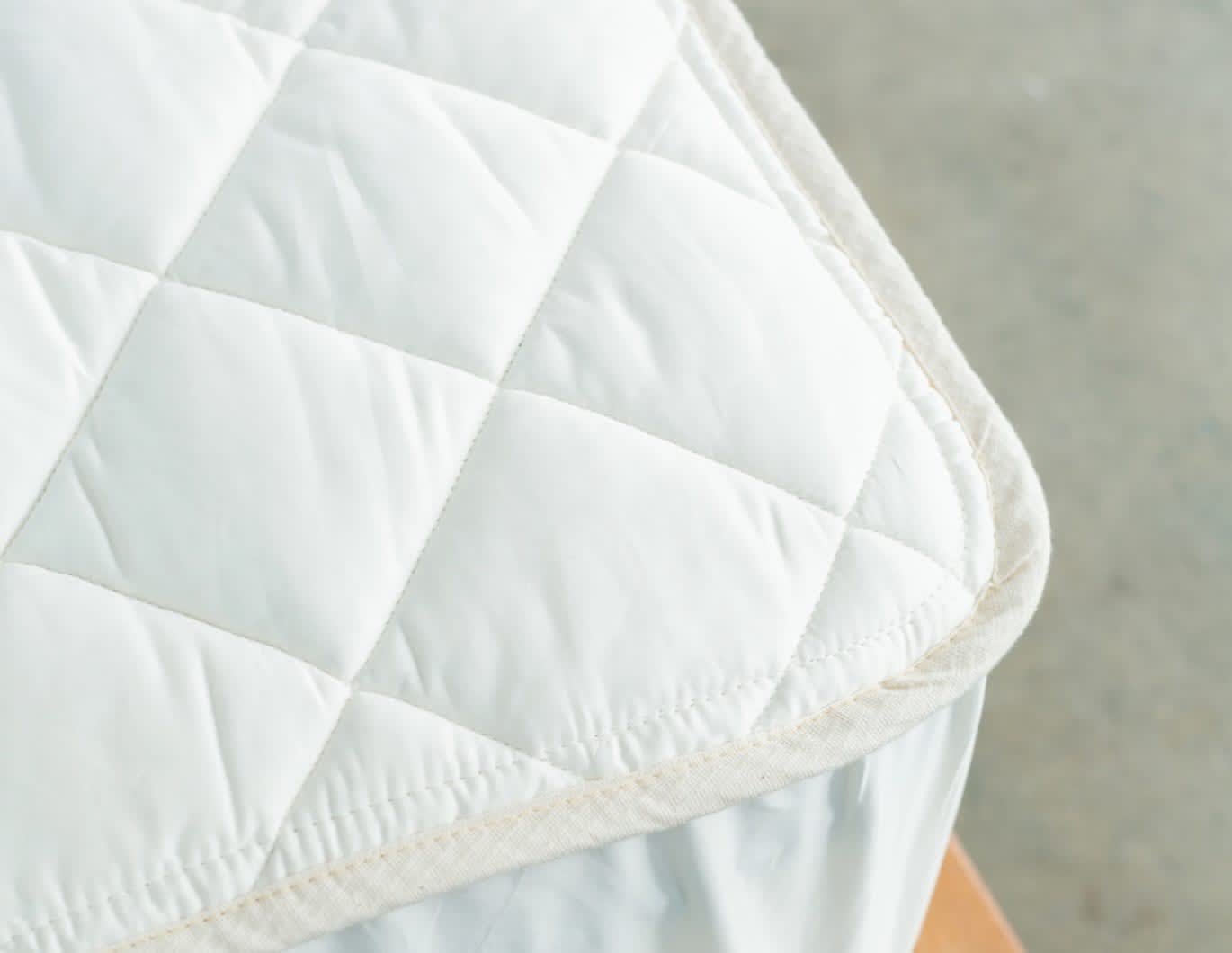
From there, our testing group, which includes sleepers of all body sizes, sleep positions, and sleep preferences, got to trying each mattress out. They provided scores for key performance categories (think motion isolation, pressure relief, and temperature control), then assigned superlatives to each bed. After that, they determined which organic mattresses were the absolute best.
Our Testing Team

Logan Foley
Editorial Director
Full Bio

Mary Fenton
Head of Product Content
Full Bio

Jeremy Klein
Senior Product Testing Manager
Full Bio

Brad Nehring
Senior Product Analyst
Full Bio

Colin Simpson
Product Research Manager
Full Bio
Best Organic Mattress Overall: Birch Mattress
Best Organic Mattress Overall
8.8/10Test Lab Score
Birch Mattress
A latex hybrid with responsive comfort materials and a robust support system.
Key Details
- Who It’s Best For: Side and stomach sleepers who weigh at least 130 pounds, and back sleepers between 130 and 230 pounds.
- Feel: Bouncy and responsive to movement with extra perimeter reinforcement.
- What It’s Made Of: Wool batting and latex in the comfort system, followed by pocketed coils in the support core.
- What We Don’t Like: Limited motion isolation for couples, plus a sticker price that may be a dealbreaker for budget shoppers.
Scoring & Reviews
The following ratings show how suitable this mattress is for different sleeping positions and sleeper weights. These scores are determined by how well the mattress supports and relieves pressure for each sleeper type.
In addition to the hands-on feedback from our team, we conduct a number of quantitative tests in our Test Lab. The below ratings are based on the experience of our testers.
SELECT AN ICON TO VIEW DETAILS:
Motion Isolation
The Birch Natural Mattress definitely has more bounce than contouring, which in our testing lab meant more motion transfer. Vibrations from movement on one part of the bed could be felt at least lightly on other parts of the bed. For most couples, a little motion transfer doesn’t create significant problems. But if you’re easily awoken during the night, you may encounter more sleep disruptions from your bed partner’s movement when sleeping on the Birch Natural Mattress
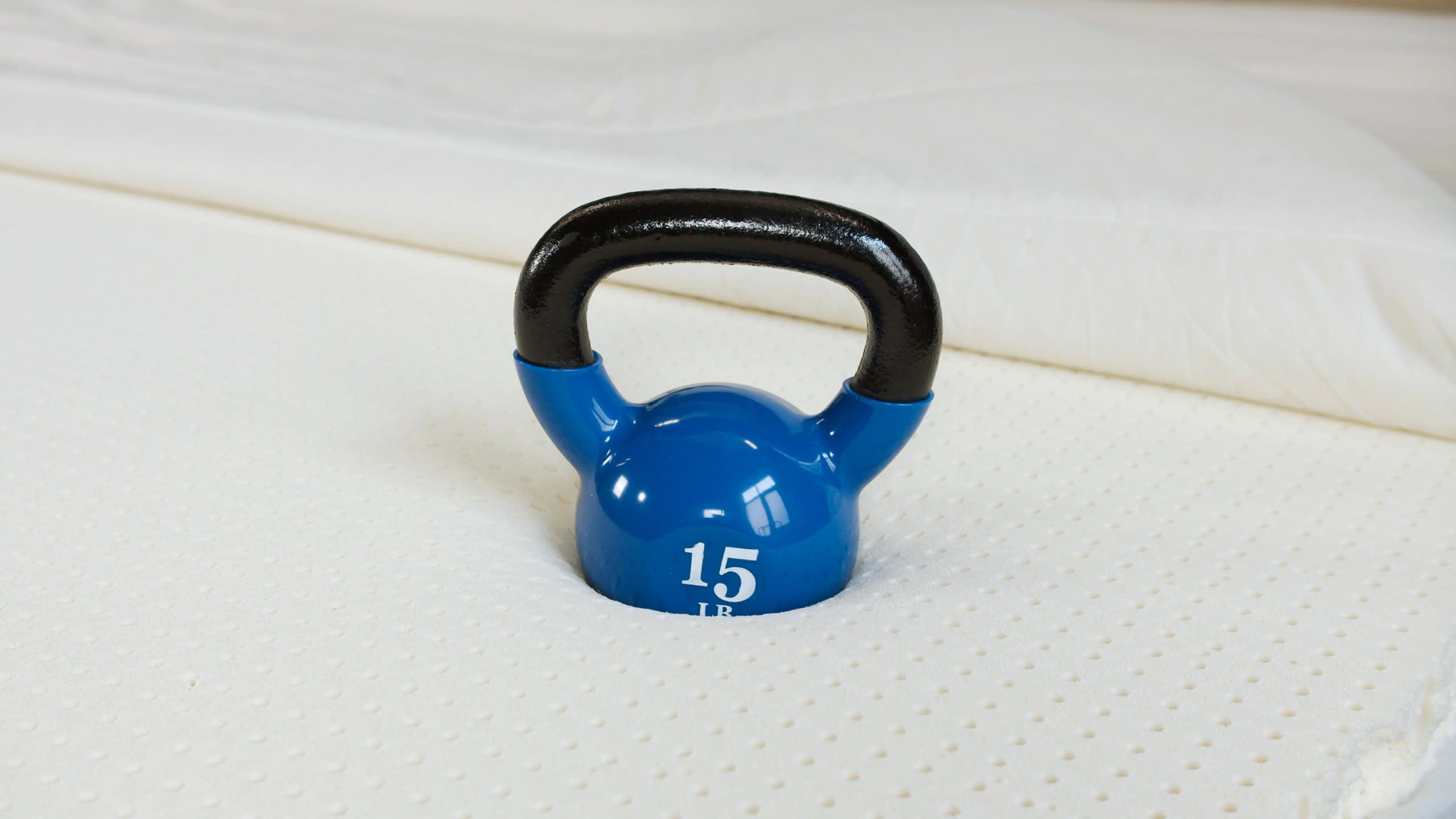
Pressure Relief
The Birch Natural Mattress offers effective pressure relief for many sleepers, but it may not be the top option for people who want deep contouring around their body.The wool and latex layers of the Birch Natural Mattress lightly cradle the joints and heavier parts of your body, but these materials do not hug you closely. In most cases, the cushioning from the latex is enough to relieve pressure, but it may be lacking in this category for people with very sharp pressure points.

Temperature Control
We found that the Birch Natural Mattress offers excellent temperature control. It has several components that promote cooling and temperature neutrality. Wool and cotton are highly breathable to wick away moisture and dissipate heat. Latex does not heat up the way foam does, and the coil support core promotes plenty of ventilation.The responsiveness of the mattress also keeps you from sinking in too far. As a result, airflow can reach your skin and help cool you down.
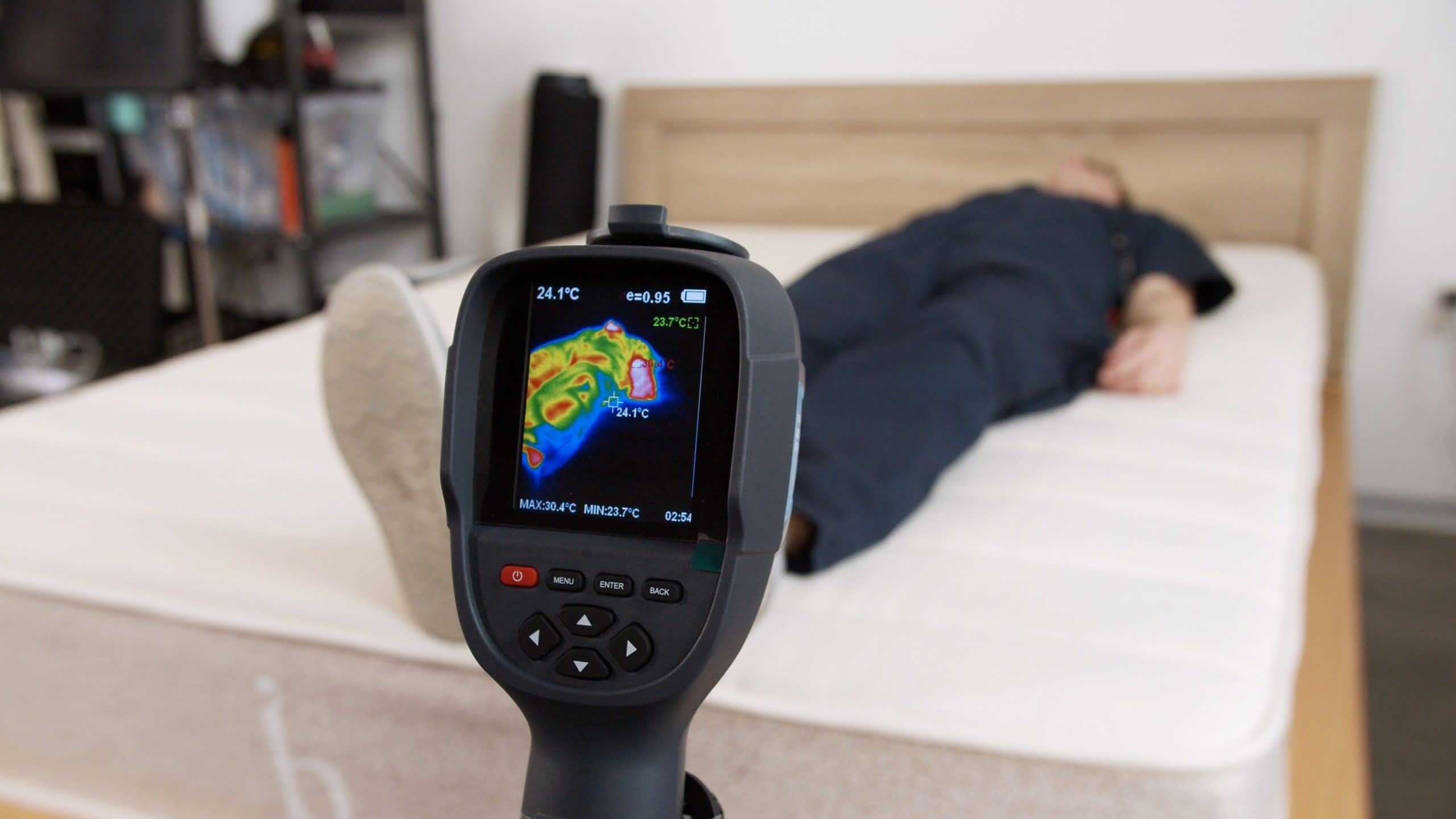
Edge Support
The Birch Natural Mattress offers solid edge support that comes from the bounciness of its materials and its thick layer of pocketed coils. The coils are reinforced around the perimeter to give the mattress a more stable feel when sitting or lying down near the edge.
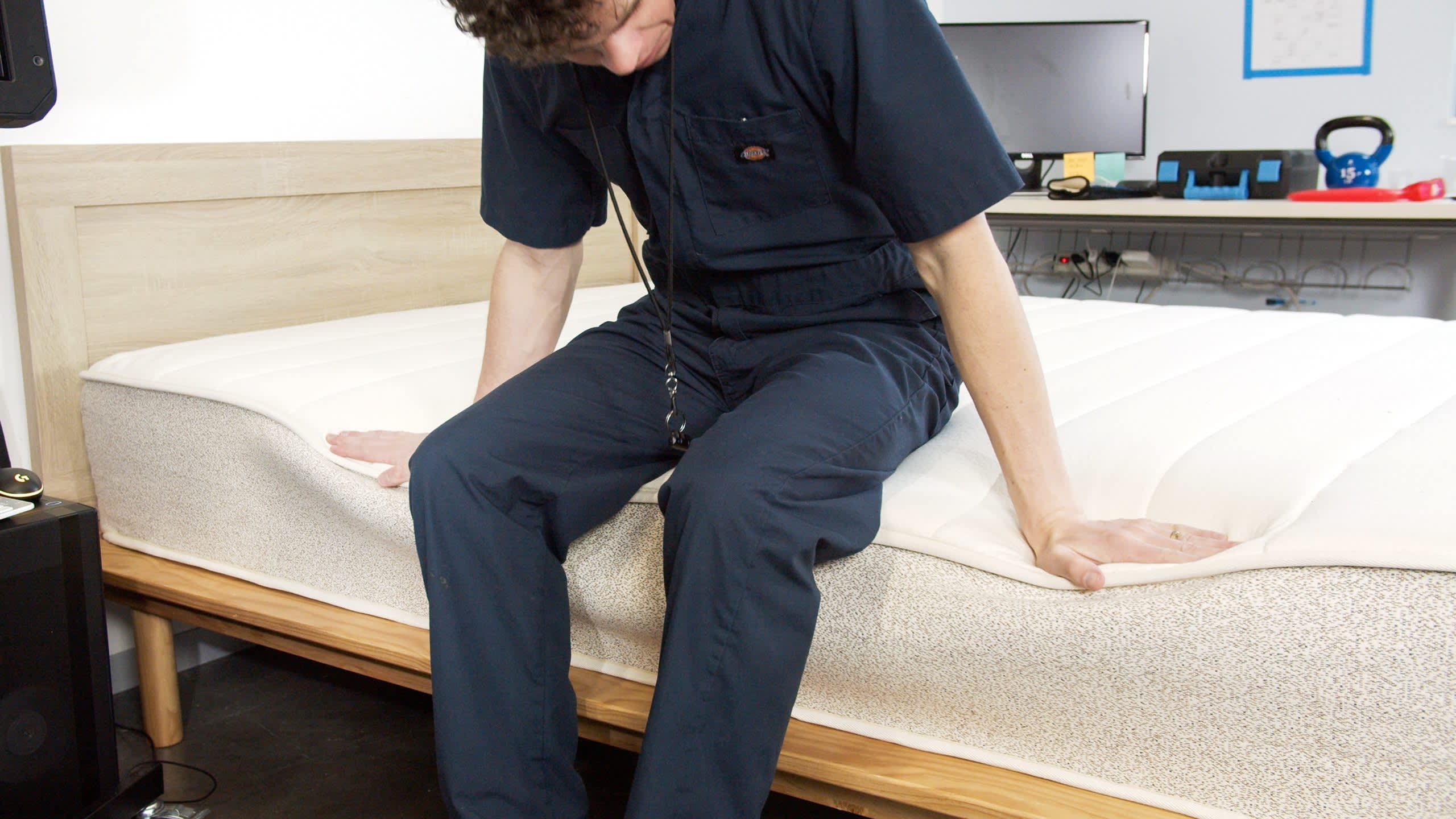
Ease of Movement
The Birch Natural Mattress keeps you from feeling stuck in one position. Our testers observed that, thanks to its responsive materials like latex and coils, you can easily adjust your sleeping position, roll over, or get up out of bed.The ease of movement on the Birch Natural Mattress makes it a good fit for combination sleepers and anyone else who prefers to feel like they are sleeping on top of the bed rather than “in” the bed.
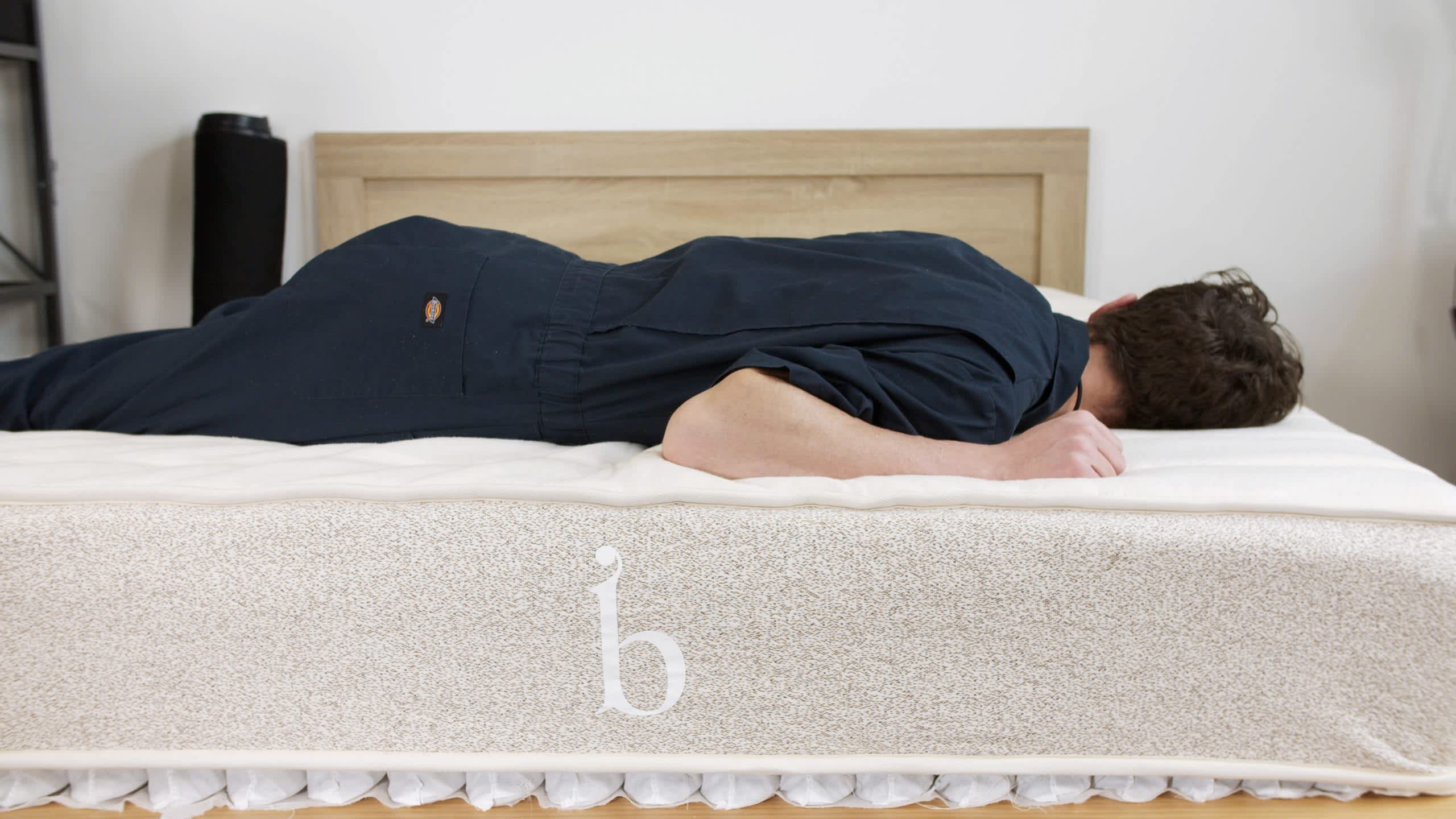
Durability
The Birch Mattress has a strong durability score thanks to its construction and natural materials. As a hybrid mattress, it combines individual pocketed metal coils in the support core with layers of Talalay latex and wool. Latex is a denser material than memory or polyfoam. That, along with the medium firm feel give this mattress more longevity up to eight or nine years.
We consider the Birch to be a standout organic mattress for a few reasons. These include a true medium firm (6) feel, which delivered a comfortable balance of cushioning and support for our testers across different body type and sleep position groups. An approachable price-point also makes the Birch one of the most affordable organic models we’ve tested.
How It Performed
The Birch drew positive ratings from most of our testers. The most favorable responses came from our side sleepers weighing at least 130 pounds, back sleepers between 130 and 230 pounds, and stomach sleepers up to 230 pounds. That said, nearly all of us awarded the mattress a rating of “good” or better.
Using thermal body sensors, we detected minimal heat buildup when testing the Birch for temperature control. We attributed this to the bed’s breathable comfort layers and strong airflow through the coil system. Our testers also encountered very little resistance when moving across the surface, and we noticed strong pushback during our edge support tests. Since high-quality latex resists indentations over time, we’ve also given the Birch an above-average rating for expected durability.
Best Mattress for Back Pain: WinkBeds EcoCloud
Best Mattress for Back Pain
9.6/10Test Lab Score
WinkBeds EcoCloud
A high-end latex hybrid crafted with zoned layers for excellent overall support.
Key Details
- Who It’s Best For: Side and back sleepers up to 230 pounds who live with frequent or chronic back pain.
- Feel: Medium (5) feel with gentle cushioning and a mellow bounce in response to movement.
- What It’s Made Of: A 4-inch comfort layer of Talalay latex over zoned pocketed coils.
- What We Don’t Like: The mattress is heavy and difficult to lift and rotate.
Scoring & Reviews
The following ratings show how suitable this mattress is for different sleeping positions and sleeper weights. These scores are determined by how well the mattress supports and relieves pressure for each sleeper type.
In addition to the hands-on feedback from our team, we conduct a number of quantitative tests in our Test Lab. The below ratings are based on the experience of our testers.
SELECT AN ICON TO VIEW DETAILS:
Motion Isolation
The EcoCloud is somewhat above average for motion isolation. While its softer Talalay latex contains some vibrations, the overall bounciness of the mattress means you’ll often notice when your bed partner rolls over or gets in or out of bed.In our testing, this motion transfer wasn’t usually enough to cause sleep interruptions. That said, it was bothersome to people who are easily awakened during the night.
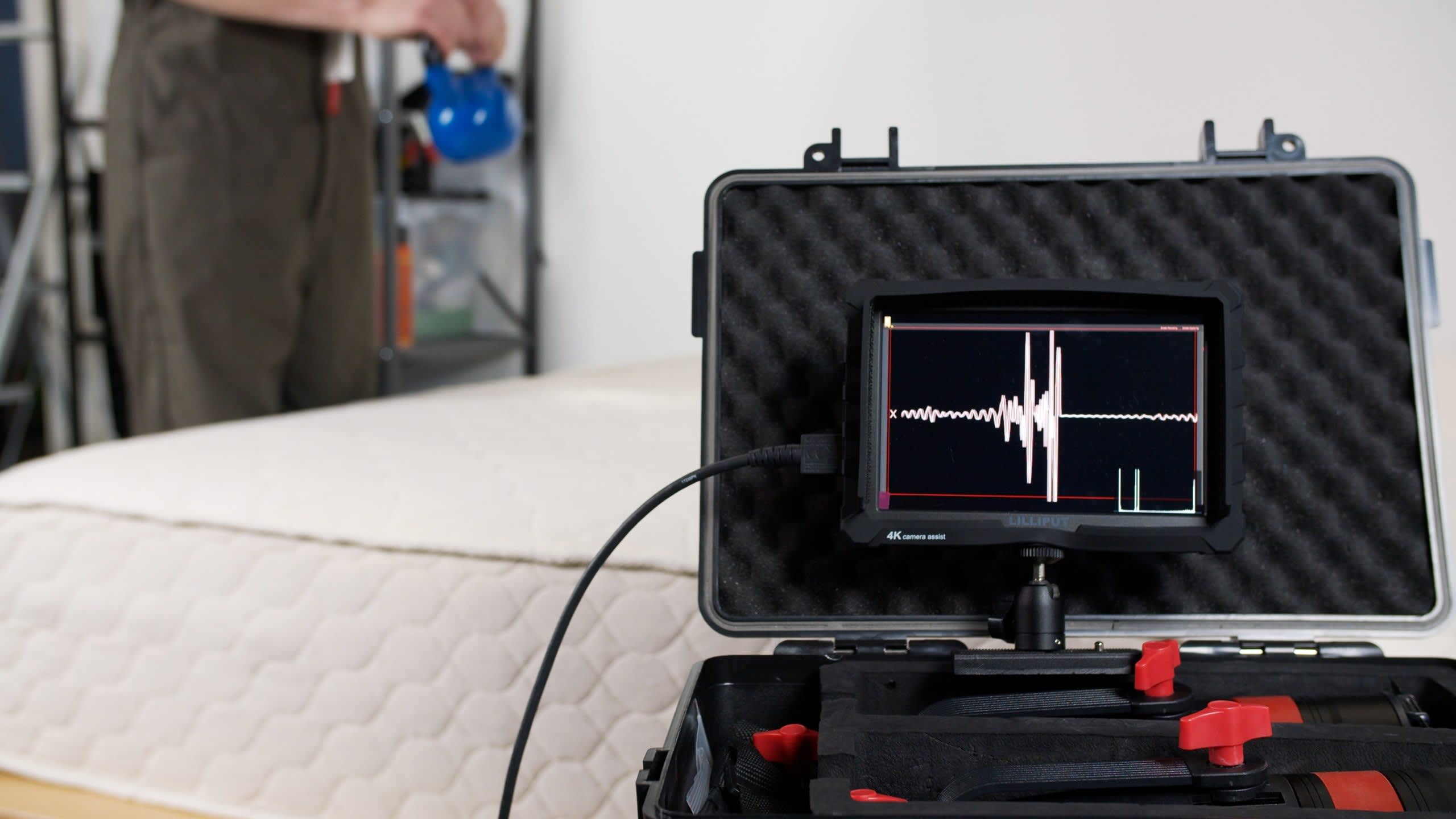
Pressure Relief
Our testing team noted great pressure relief from the EcoCloud. This results from the two textures of Talalay latex, the pocketed coils, and the medium (5) firmness with just enough cushioning for key parts of the body.Although there’s no deep hug from the EcoCloud, most sleepers in our tests were pleasantly surprised by its ability to relieve pressure and support a healthy spinal alignment.
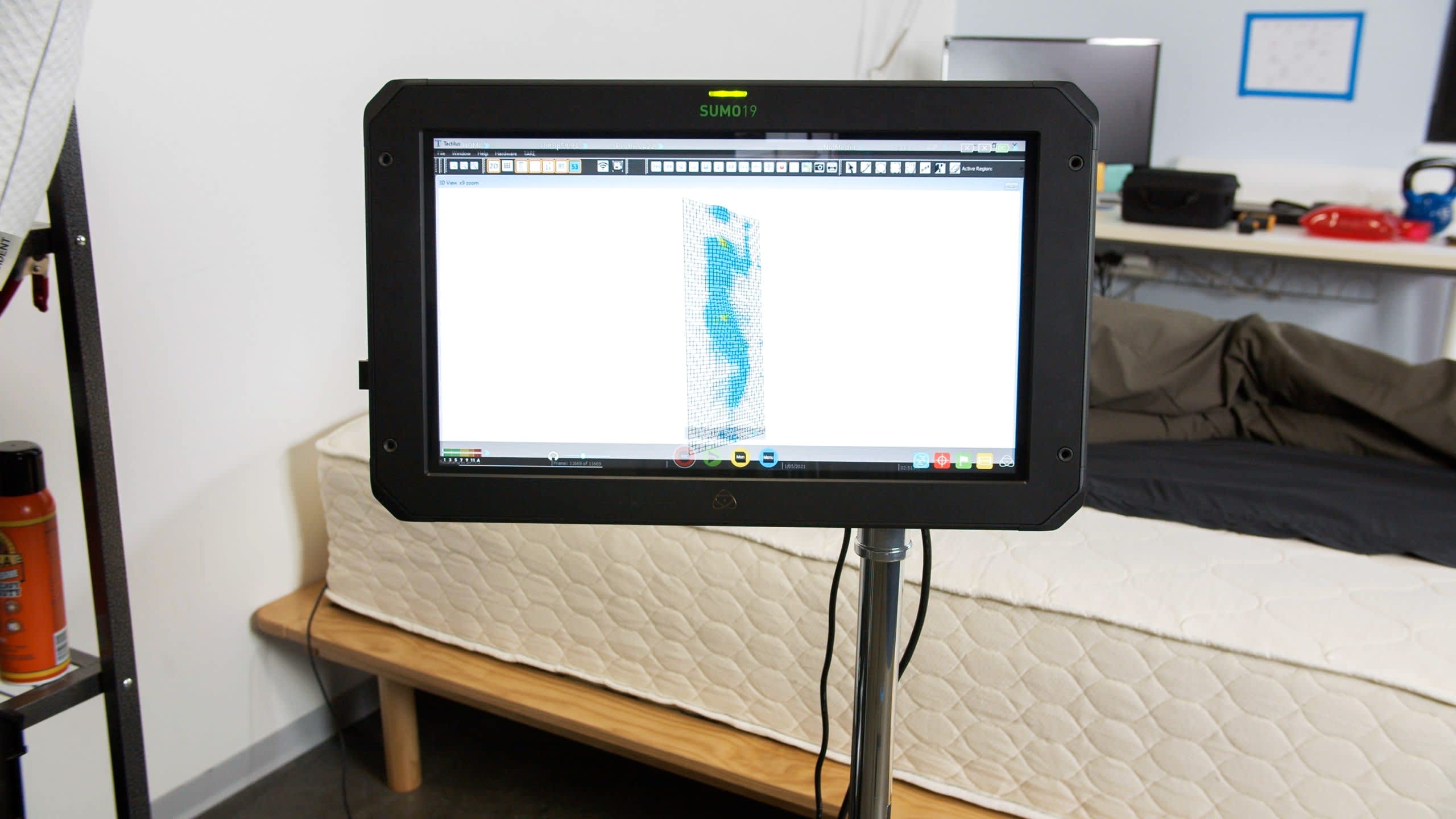
Temperature Control
The Eco Cloud’s is an excellent choice if you are a hot sleeper seeking a mattress that sleeps cool.The cotton and wool in the cover wick moisture away from your body. The aerated latex further enhances the bed’s temperature control. If heat builds up, airflow through the coils can help regulate temperature.This mattress is also resilient, making it easy to adjust your position at any time without heat getting trapped and building up around your skin.
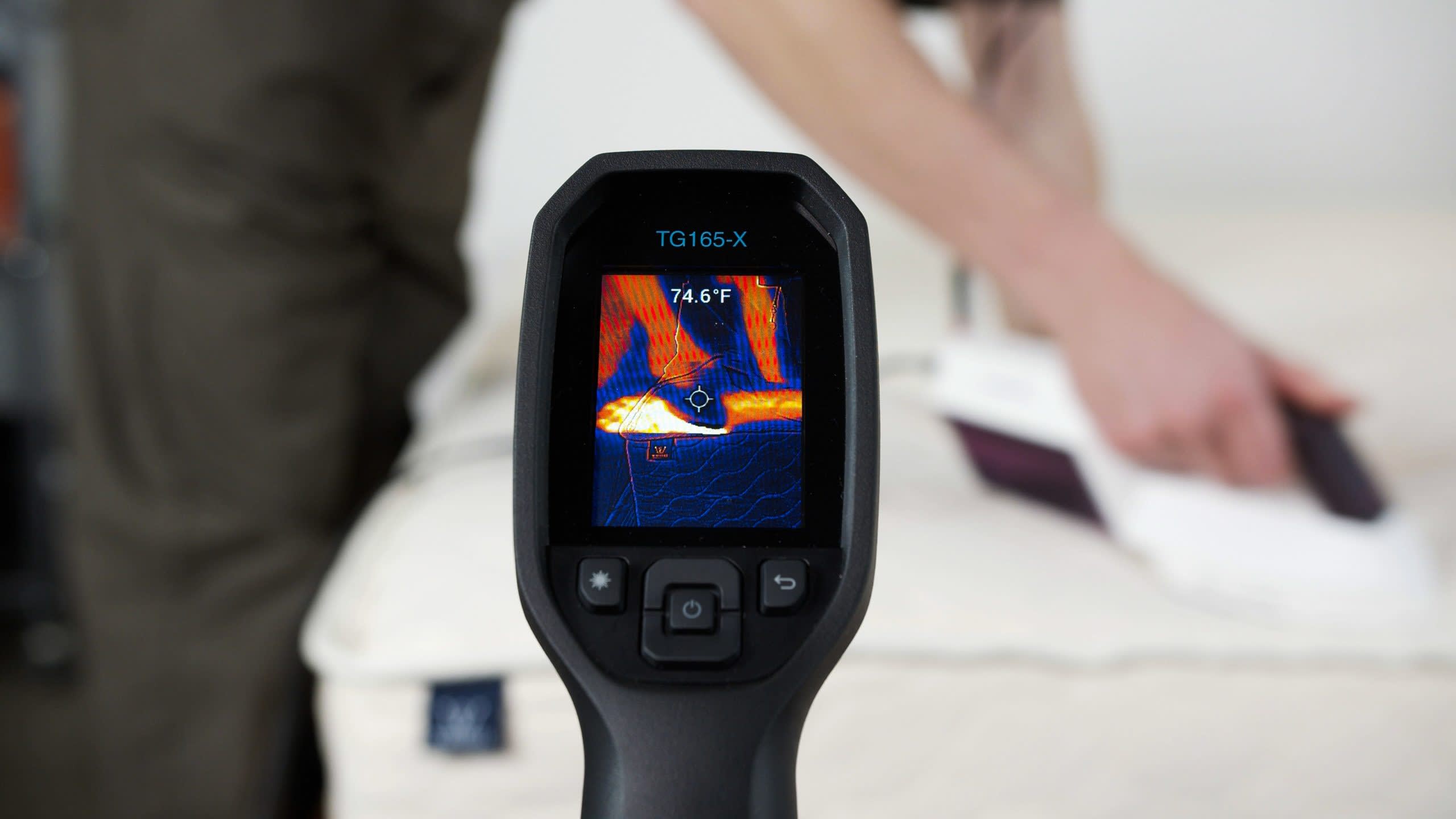
Edge Support
Reinforced coils around the perimeter of the mattress lend strong edge support to the EcoCloud. This is good news if you spend a lot of time sitting or sleeping on the edge of the bed. It’s helpful if you share a bed and want to be able to use your whole mattress surface. It can also be a plus for people with mobility issues as it makes it easier to get in and out of bed.
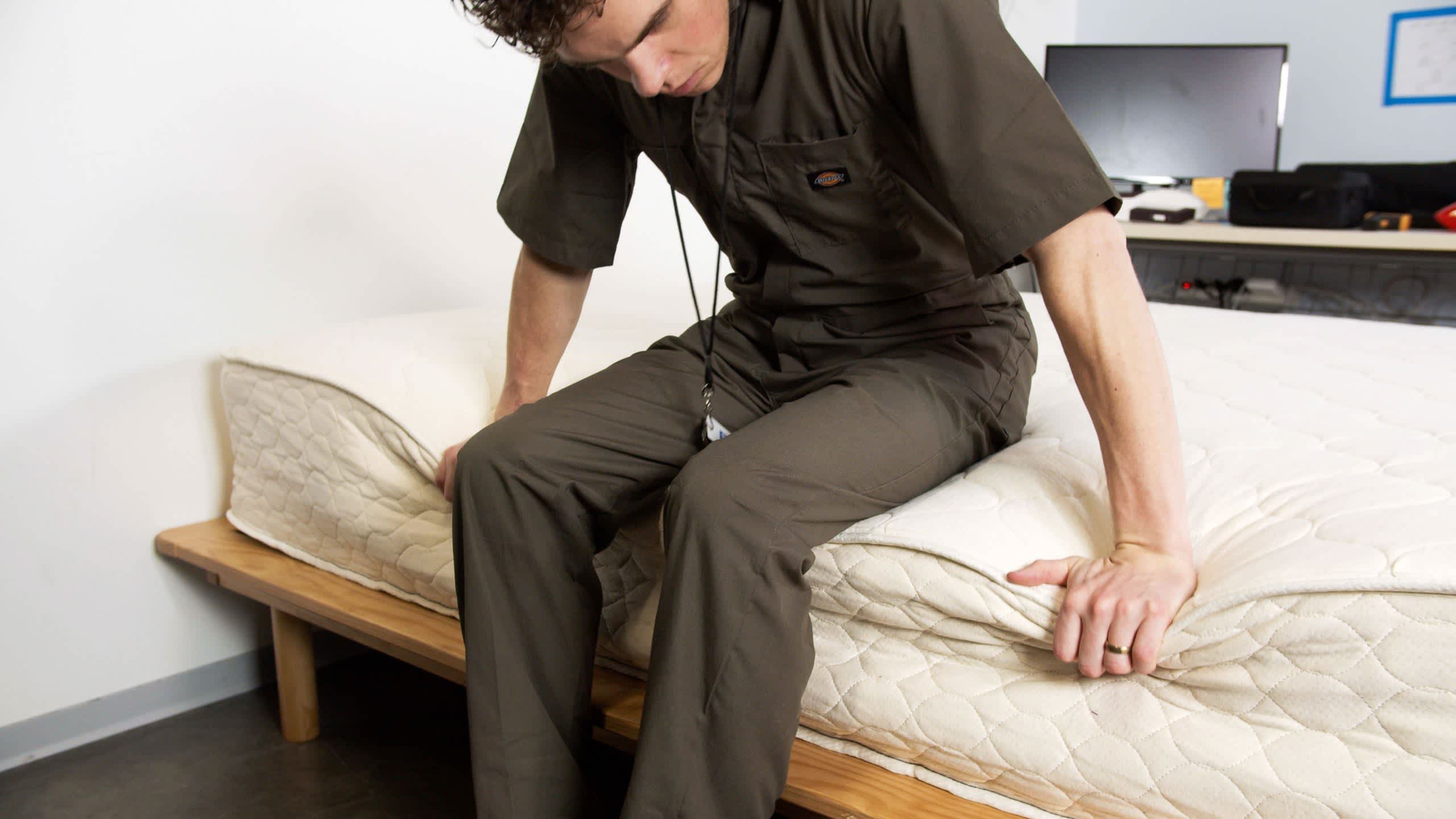
Ease of Movement
The EcoCloud was rated as exceptional for ease of movement in our testing. The springiness of the mattress meant there was virtually no resistance when adjusting your posture or switching to a different sleeping position.This ease of movement is valuable for combination sleepers and for anyone who likes to sleep more on top of the mattress rather than sinking into it.
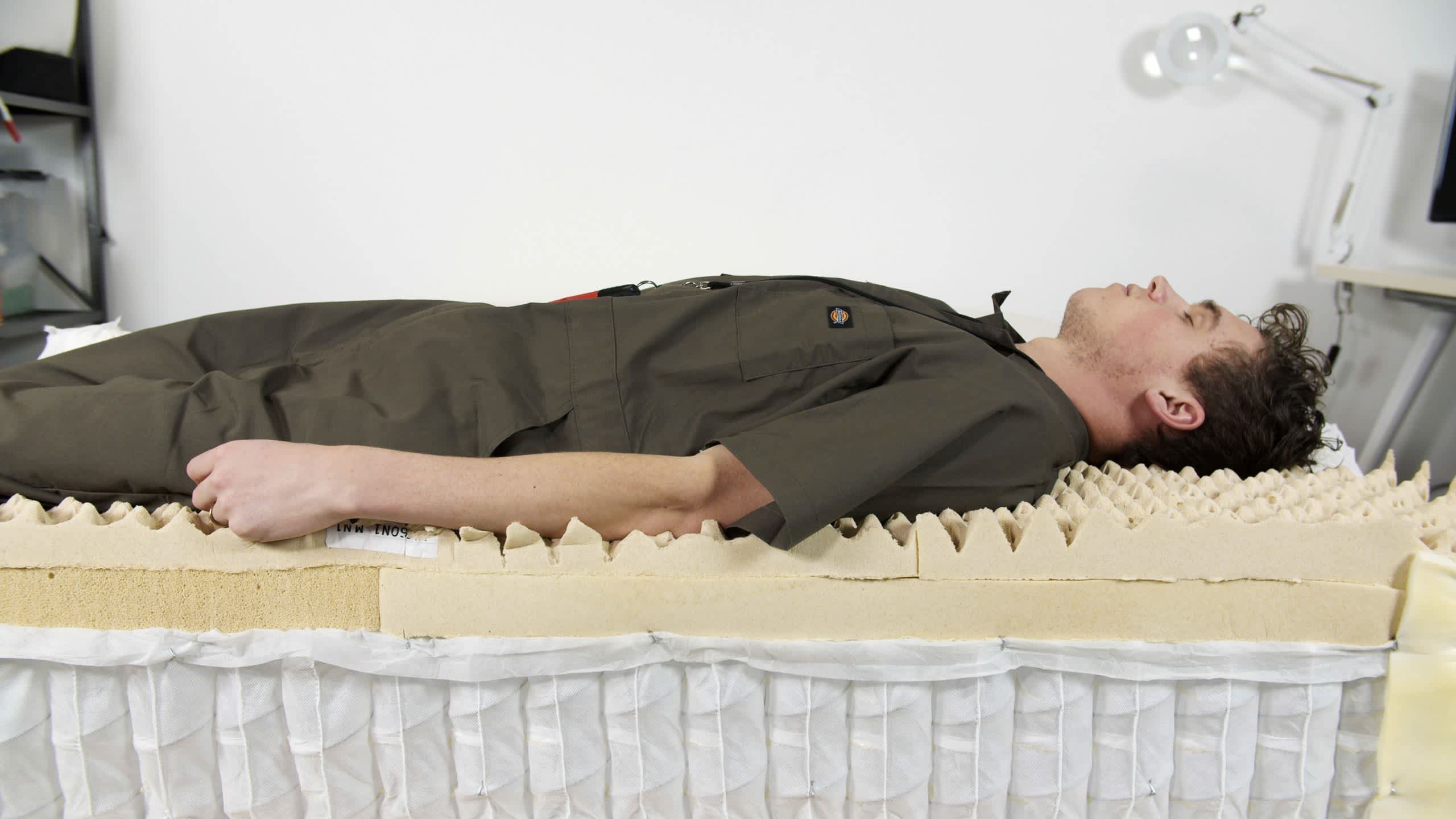
Durability
The WinkBeds EcoCloud is likely to hold up longer than many other beds on the market, potentially 10 years. Not only is its comfort layer constructed from durable Talalay latex, but it’s thicker than average, which also improves durability. The coil support core should hold up as well, as it’s usually the foam in beds that deteriorates first. The only thing keeping it from receiving a perfect durability score is the fact that the Talalay latex it uses is slightly less sturdy than Dunlop latex.
The WinkBeds EcoCloud’s combination of deep cushioning and targeted support makes it an approachable mattress option for a wide range of sleepers. The mattress achieves this balanced medium (5) feel with a thick comfort layer reinforced with robust pocketed coils, both layers zoned to feel firmer and denser beneath heavier areas of your body.
How It Performed
Our tests show the EcoCloud provides adequate contouring for side sleepers while maintaining an even sleep surface for back and stomach sleepers. Ratings were particularly strong among our side and back sleepers weighing up to 230 pounds. We all noticed generous pushback around the midsection, but this didn’t affect cushioning from the thick latex comfort layer.
Temperature control, ease of movement, and edge support were some of the EcoCloud’s strongest performance areas during our tests. These are areas where latex hybrids typically stand out. The thick comfort layer and softer feel also earned the mattress high marks for pressure relief, an area where latex hybrids often underperform.
Most Comfortable Mattress: PlushBeds Botanical Bliss
Most Comfortable Mattress
9.6/10Test Lab Score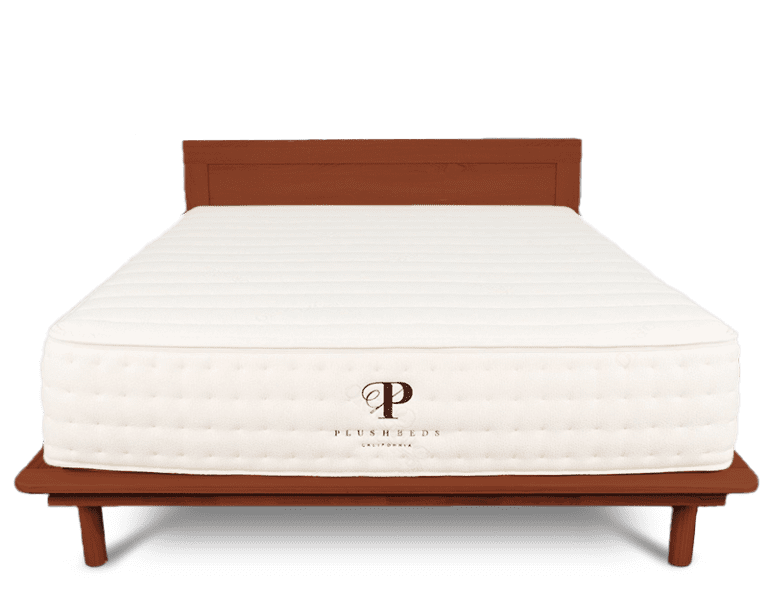
PlushBeds Botanical Bliss
An eco-friendly organic latex mattress with two different firmness options.
Key Details
- Who It’s Best For: People with back pain looking for a mattress with swappable comfort layers.
- Feel: Very responsive and bouncy with a gentle contour.
- What It’s Made Of: Top layer of wool batting, followed by three to four layers of organic latex
- What We Don’t Like: Quite heavy, weighing in over 200 pounds in its thickest and largest design.
Scoring & Reviews
The following ratings show how suitable this mattress is for different sleeping positions and sleeper weights. These scores are determined by how well the mattress supports and relieves pressure for each sleeper type.
In addition to the hands-on feedback from our team, we conduct a number of quantitative tests in our Test Lab. The below ratings are based on the experience of our testers.
SELECT AN ICON TO VIEW DETAILS:
Motion Isolation
Our testers found that there was clearly noticeable motion transfer on the PlushBeds Botanical Bliss mattress. Bouncy Talalay latex in the top layer means that you’ll feel when your bed partner gets in and out of their side of the bed.Of the two firmness options, the medium firm (6) model transfers less motion. On either version, though, the vibrations from movement aren’t significant enough to wake up the average sleeper.
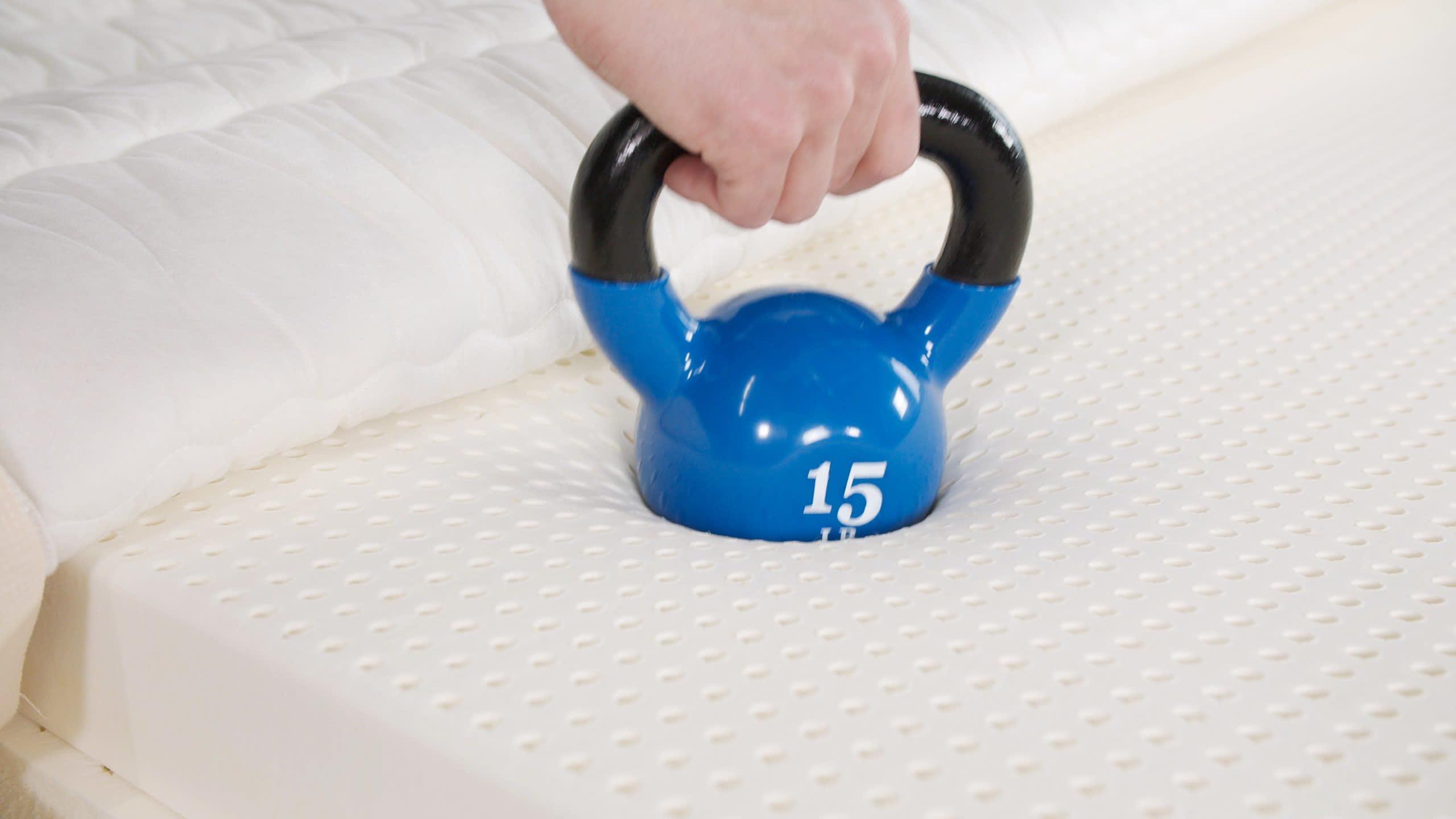
Pressure Relief
Latex mattresses conform to the body a bit, but not quite as much as foam, and the PlushBeds Botanical Bliss is no different. For some sleepers, particularly lighter side sleepers, we found there to he a bit of pressure on the shoulder and hips.
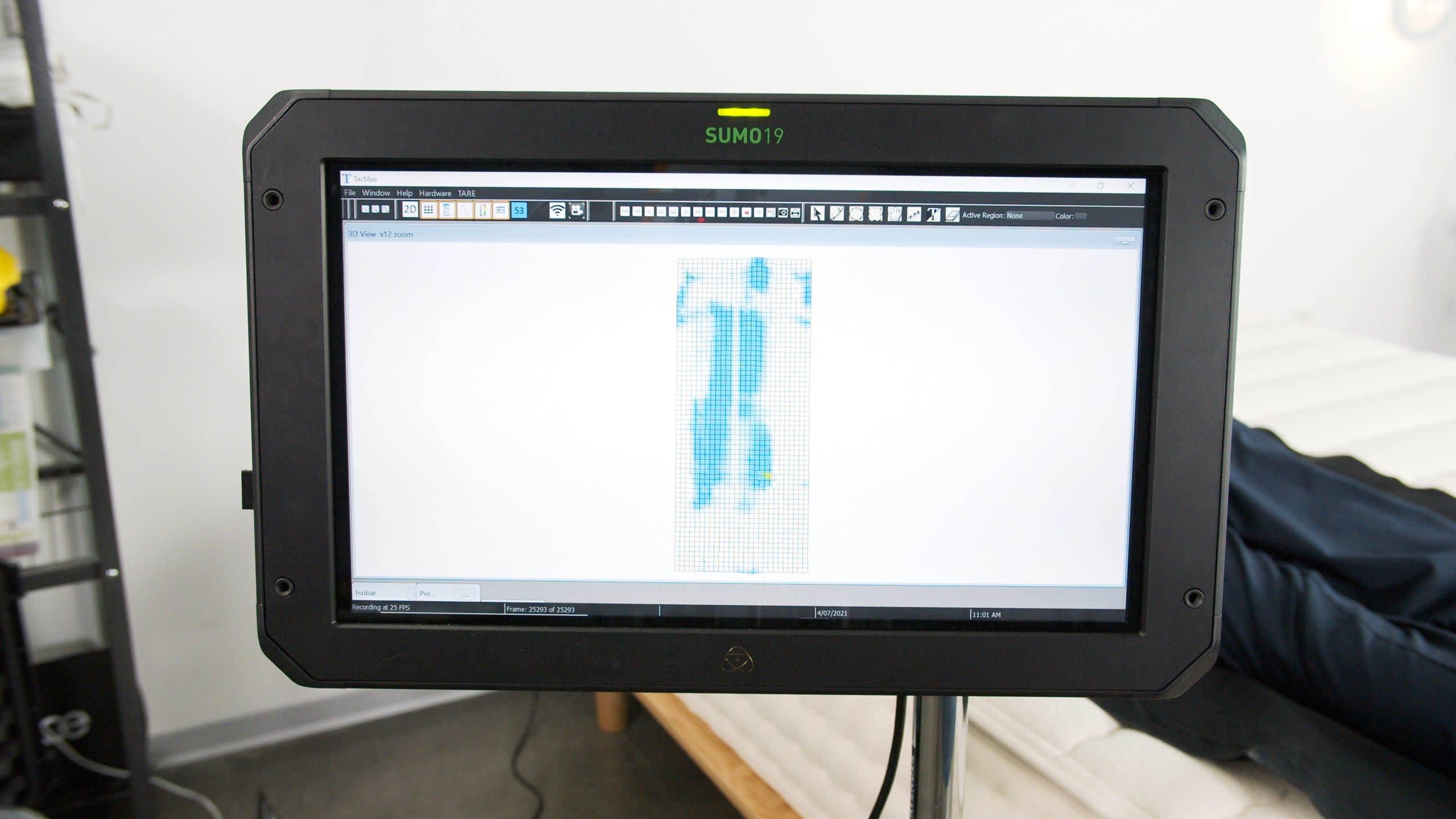
Temperature Control
Few mattresses offer as much temperature neutrality as the PlushBeds Botanical Bliss. Its exterior materials of cotton and wool are breathable and moisture-wicking, and the latex layers retain almost no heat. On top of that, the limited contouring means there’s plenty of room for air to flow over your skin and keep you from overheating.

Edge Support
The PlushBeds Botanical Bliss provides significant edge support, especially compared to a memory foam mattress. Generally speaking, latex sinks less and provides more pushback than foam.There’s a touch more edge support on the firm (7) model, but you can confidently use the entire mattress surface on either version of the Botanical Bliss without a risk of the edges buckling.

Ease of Movement
Moving on the surface of the Botanical Bliss is almost completely free of resistance. The springiness of the latex layers contributes to smooth, easy movement. It’s a dramatic difference compared to mattresses that have a lot of contouring or sink.
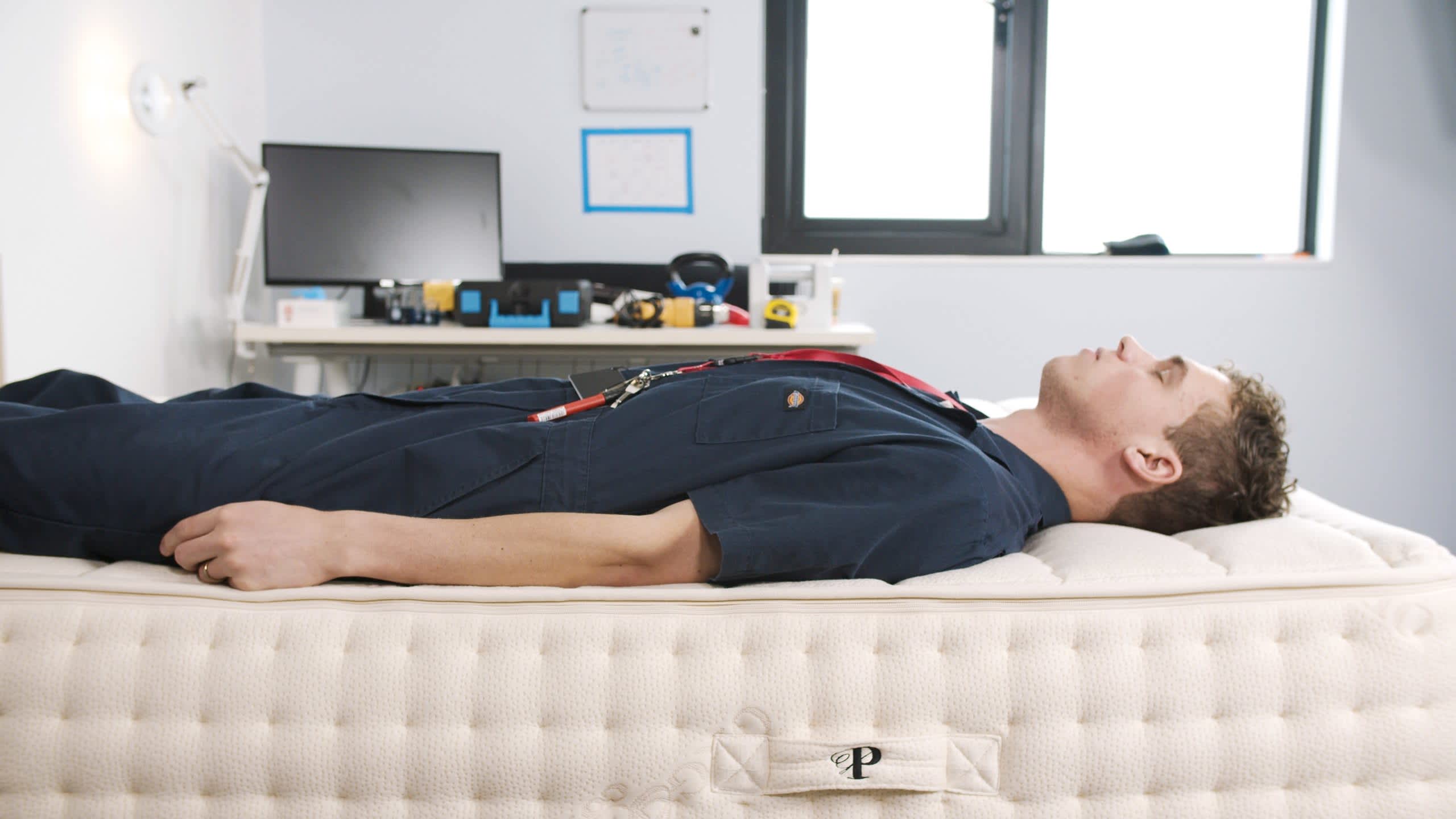
Durability
The PlushBeds Botanical Bliss earns a perfect durability score thanks to its high-end latex construction. It features both Talalay and Dunlop latex in its comfort layer and an additional six inches of Dunlop latex in the support layer. This material is superior to foam in terms of durability. Though you should expect about 10 years out of this mattress, you can extend the life even further by going with the firmer feel and thicker profile.
Many sleepers with back pain find relief through all-latex mattresses, which gently adapt to the body without the deep hug or sinkage of foam layers. The PlushBeds Botanical Bliss is an all-latex model available in multiple firmness and thickness levels, allowing you to choose the design best suited to your body type and primary sleep position.
How It Performed
We’ve personally tested each firmness and thickness option for the Botanical Bliss. Overall, models with a medium (5) feel earned their most favorable ratings from our testers weighing up to 230 pounds, particularly side and back sleepers. We attribute this to deep contouring and cushioning from the latex layers. The firm (7) feel was better suited to our testers who weigh more than 230 pounds, though back and stomach sleepers between 130 and 230 pounds also felt comfortable lying on these models.
Profile also played a role in our tests. The 9-inch and 10-inch models provided adequate support to our testers weighing up to 230 pounds. Those of us who weigh more preferred the added reinforcement of the 12-inch model. Since all layers of the Botanical Bliss are ventilated and the top layer is composed of moisture-wicking wool, we don’t expect bothersome heat retention to be an issue. The natural responsiveness of latex also makes the surface easy to move across, and the mattress should be suitably bouncy for most couples during sex.
Best Mattress for Pressure Relief: Leesa Natural Hybrid
Best Mattress for Pressure Relief
8.9/10Test Lab Score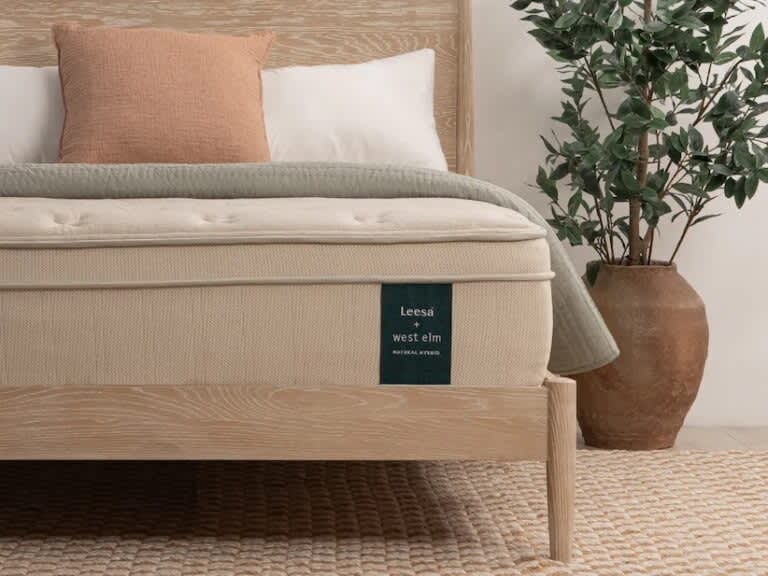
Leesa Natural Hybrid
A latex hybrid that incorporates natural materials for long-lasting comfort and support.
Key Details
- Who It’s Best For: Side sleepers who weigh at least 130 pounds and back sleepers up to 230 pounds.
- Feel: Medium firm (6) with deep cushioning from the foam layers and a light bounce from the latex.
- What It’s Made Of: Comfort layers of wool batting, memory foam, Talalay latex, and transitional foam over pocketed coils made of reclaimed steel and high-density base foam. The cover is 100% organic cotton.
- What We Don’t Like: While the Sapira Chill Hybrid offers above-average motion isolation and pressure relief, its thick foam layers may hinder movement on the surface for people who weigh more than 230 pounds. There’s also some noticeable off-gassing odor when the mattress is removed from its shipping box.
Scoring & Reviews
The following ratings show how suitable this mattress is for different sleeping positions and sleeper weights. These scores are determined by how well the mattress supports and relieves pressure for each sleeper type.
In addition to the hands-on feedback from our team, we conduct a number of quantitative tests in our Test Lab. The below ratings are based on the experience of our testers.
SELECT AN ICON TO VIEW DETAILS:
Motion Isolation
The Leesa Natural is fairly responsive to movement, so you may notice ripples of movement when your sleep partner gets up or changes positions – and vice versa. If you’re easily woken by motion, a mattress that adapts to your body and absorbs movement will probably be a better fit.
Pressure Relief
Since the Leesa Natural contains latex, it doesn’t contour to your body in the same way as memory foam. That said, the mattress offers ample cushioning and side sleepers shouldn’t feel too much pressure buildup in their shoulders and hips.
Temperature Control
Temperature control is one of the Leesa Natural’s defining strengths. Moisture-wicking wool helps you stay cool and dry, the latex is ventilated to promote airflow close to the surface, and the coils also generate circulation to maintain a comfy interior temperature. A breathable organic cotton cover adds to the excellent thermoregulation.
Edge Support
The Leesa Natural Hybrid offers solid edge support. A firm feel and reinforced perimeter coils ensure minimal compression when you sleep or sit along the edges, and the latex recovers its shape instantly once the weight is removed.
Ease of Movement
The Leesa Natural is easy to move on thanks to its latex layer, which responds to motion with a noticeable bounce and doesn’t sink too much beneath your weight. Thick pocketed coils add to the springy design. Most of our testers were able to move from one side of the mattress to the other without feeling stuck in the middle.
Durability
The Leesa combines durable natural latex with less-durable polyfoam and memory foam. While synthetic foams are likely to develop body impressions, the latex helps protect against excessive softening of the overall comfort system. Steel coils in the support core also help boost longevity. With its medium-firm surface keeping sleepers mostly “on” instead of “in” the bed, we anticipate the lifespan of the Leesa Natural Hybrid to fall somewhere between seven and eight years.
With a design that incorporates organic materials like wool batting and Talalay latex along with adaptive memory foam and transitional polyfoam, the Leesa Natural Hybrid gives sleepers the best of both worlds in terms of cushioning and bounce. The mattress also offers excellent temperature regulation and alleviates pressure better than most traditional latex hybrids.
How It Performs
With a medium firm (6) feel, the Leesa Natural is a solid match for side and back sleepers between 130 and 230 pounds. Our hands-on tests also show the mattress should provide adequate support for side sleepers over 230 pounds and back and stomach sleepers under 130 pounds.
Temperature control is a defining strength of the Leesa Natural. Wool batting sewn to the cover has moisture-wicking properties to help sleepers stay cool and dry, while the latex is ventilated to push airflow close to the surface and the coils promote additional circulation to maintain a comfortable interior temperature. Pressure relief is another performance area where this mattress shines – the memory foam adds just the right amount of plushness to soothe aches and sore spots.
Best Mattress for Side Sleepers: Birch Luxe
Best Mattress for Side Sleepers
9.3/10Test Lab Score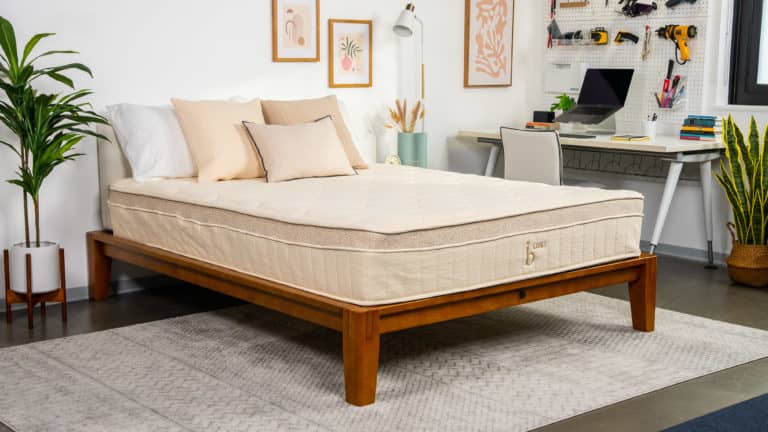
Birch Luxe
Luxury latex hybrid with a medium firm feel.
Key Details
- Who It’s Best For: Side, back, and stomach sleepers across most weight groups and people who run hot in bed.
- Feel: Medium firm (6) design with gentle cushioning, targeted support for the lower back, and a light bounce in response to movement.
- What It’s Made Of: A comfort system with several layers of wool batting and two layers of Talalay latex, followed by pocketed coils with zoned lumbar support and a base layer of wool and rayon batting.
- What We Don’t Like: Luxury price tag may be a dealbreaker for shoppers with limited budgets.
Scoring & Reviews
The following ratings show how suitable this mattress is for different sleeping positions and sleeper weights. These scores are determined by how well the mattress supports and relieves pressure for each sleeper type.
In addition to the hands-on feedback from our team, we conduct a number of quantitative tests in our Test Lab. The below ratings are based on the experience of our testers.
SELECT AN ICON TO VIEW DETAILS:
Motion Isolation
Any mattress with springs inevitably transfers some motion, which is why all-foam models typically outperform hybrids in this category. Latex is bouncier than foam, so the Birch Luxe Mattress isn’t as effective at curbing movement when compared to hybrids with foam comfort systems.
Pressure Relief
The Birch Luxe offers a moderate amount of pressure relief. The latex contours somewhat, but the mattress is firm enough to help evenly distribute body weight and encourage a straighter spine. Side sleepers and those who weigh less than 130 pounds might prefer a softer model with more cushioning. People over 130 pounds of any sleep position should experience notable contouring and adequate support.
Temperature Control
Hybrids are typically better at regulating temperature than all-foam mattresses, as foam tends to trap heat. The Birch Luxe regulates temperature exceptionally well. The cover and comfort system use naturally breathable materials, including cotton and wool, to help draw heat and moisture away from the body. When compared to memory foam, natural latex has an airier structure that resists heat buildup. Plus, the pocketed spring support core also offers space for air to circulate.
Edge Support
The Birch Luxe features a hefty coil core that’s designed to minimize sagging throughout the mattress. Heavier gauge coils along the perimeter provide extra reinforcement, delivering above-average edge support.
Ease of Movement
The Birch Luxe’s construction makes it easy for sleepers to move around on its surface. Latex is notable for its responsiveness, which is helpful when changing sleeping positions. The coil support system also makes getting in and out of bed easier. The medium firm (6) feel of the bed doesn’t compress significantly, preventing the feeling of being trapped in the bed.
Durability
Thanks to its use of natural, durable materials, the Birch Luxe should perform for at least nine to 10 years, which is considerably longer than the average bed. Unlike foam, latex resists impressions and sagging, and the wool and cotton used throughout the construction should prove sturdy, too. Coils are generally more durable than polyfoam for support and should maintain their performance over time.
Side sleepers often need more cushioning for their bodies than back or stomach sleepers – this helps ensure adequate support for their shoulders and hips, two common areas of pressure buildup when lying on your side. The Birch Luxe offers a soothing balance of plushness and support with extra coil reinforcement for the lower back. Breathable materials also make the mattress a great option for hot sleepers.
How It Performs
Most of our testers were impressed with the Birch Luxe. This medium firm (6) mattress earned its most favorable ratings from side sleepers between 130 and 230 pounds and back and stomach sleepers weighing at least 130 pounds, but it received high marks across the board. We enjoyed the subtle cushioning of the latex layer, the zoned coil support, and the light bounce whenever we needed to move across the surface.
Temperature control is a standout strength of the Birch Luxe. From moisture-wicking wool and ventilated latex in the comfort system to the open coil system that promotes steady internal airflow, this mattress sleeps cool inside and out. We also found the perimeter quite stable with little to no compression when we took turns sitting along the edges.
Best Mattress for Spinal Alignment: Bear Natural
Best Mattress for Spinal Alignment
7.5/10Test Lab Score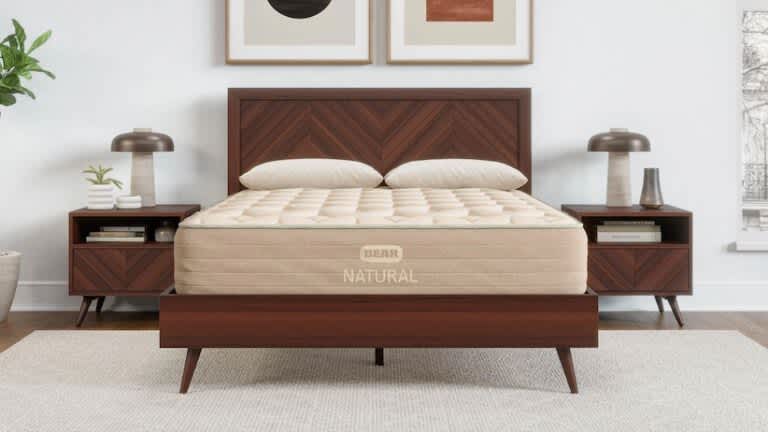
Bear Natural
Latex hybrid with a supportive, bouncy surface.
Key Details
- Who It’s Best For: Side sleepers who weigh at least 130 pounds, back sleepers up to 230 pounds, and stomach sleepers under 130 pounds.
- Feel: A slightly cushy surface that conforms to your body without too much hug, and extra pushback beneath your shoulders and hips.
- What It’s Made Of: Comfort layers of ventilated latex and transitional polyfoam over zoned pocketed coils that feel more supportive beneath your lumbar region and hips.
- What We Don’t Like: You may notice motion transfer when your sleep partner moves in bed, and vice versa.
Scoring & Reviews
The following ratings show how suitable this mattress is for different sleeping positions and sleeper weights. These scores are determined by how well the mattress supports and relieves pressure for each sleeper type.
In addition to the hands-on feedback from our team, we conduct a number of quantitative tests in our Test Lab. The below ratings are based on the experience of our testers.
SELECT AN ICON TO VIEW DETAILS:
Motion Isolation
The Bear Natural’s moderate motion isolation is on par with many competing latex hybrids.Because the top layer uses Talalay latex, which is naturally springy, some vibrations spread across the surface. The secondary polyfoam layer dampens the movement, though, and the individually pocketed coils help to minimize additional motion transfer.We don’t expect this level of movement to cause problems for most sleepers, but those who wake up easily may notice it more.
Pressure Relief
Thanks to its combination of cushioning and contouring, the Bear Natural’s pressure relief is similar to many of the best latex mattresses.The cotton quilting cover softens the surface, while the Talalay latex comfort layer cradles the sleeper without hugging them too closely. The zoned pocketed coils target pressure relief and spinal support.
Temperature Control
The Bear Natural offers temperature control that’s in line with some of the best hybrid mattresses.The organic cotton coverlets air circulate in and out of the mattress to limit heat retention. Additionally, air moves relatively freely through the Talalay latex layer and coil core to keep the sleep surface at a more neutral temperature.
Edge Support
The Bear Natural Mattress has stable edges thanks to coils that reinforce the core’s perimeter. The fully usable surface area may appeal to couples and sleepers with mobility issues who need to sit before getting into or out of bed.Most testing team members were able to lie along the sides of the bed without feeling like they were about to roll off. Those over 230 pounds felt slightly less secure.
Ease of Movement
The Bear Natural’s latex hybrid design is quite responsive and helpful for facilitating movement. The buoyant latex layer spreads compression over the surface and springs back to its original shape when the sleeper moves so they don’t feel stuck in their own body impression. The coil core also adds bounce.Our testers felt they could easily change positions and move across the mattress’ surface, making the Bear Natural well suited to active sleepers and those with mobility issues.
Durability
The Bear Natural’s medium-firm surface holds up well against body impressions, and the thicker-than-average profile ensures that even with mild indentations, you shouldn’t be in danger of hitting the coils. Talalay latex isn’t quite as dense as Dunlop latex, and the Bear Natural Mattress has a layer of polyfoam that could contribute to some sinkage. However, we don’t believe these caveats will affect the longevity of this latex hybrid, likely around seven to eight years.
The Bear Natural is a hybrid that combines responsive Talalay latex with dense contouring foam. A medium firm (6) feel gives the Natural a very balanced feel, and most people should find the mattress comfortable regardless of how much they weigh or which sleep position they prefer.
How It Performed
During our hands-on tests, the Natural received favorable ratings from most of our testers. The highest marks came from side sleepers weighing at least 130 pounds, back sleepers up to 230 pounds, and stomach sleepers under 130 pounds. Many of our testers remarked on the mattress’ deep contouring, which we’ve attributed to the foam transitional layer — traditional latex hybrids tend to feel bouncier and conform less.
Ease of movement and edge support were two highlights during our performance tests. The zoned inner coils and reinforced perimeter make the mattress feel very sturdy, and uncomfortable sinkage shouldn’t be an issue when you get in and out of bed or move across the surface. We were also impressed with the Natural’s pressure-relieving and cooling abilities.
Best Value: Awara Natural Luxury Hybrid
Best Value
8.9/10Test Lab Score
Awara Natural Luxury Hybrid
A budget-friendly latex hybrid with strong support and excellent lasting power.
Key Details
- Who It’s Best For: Back and stomach sleepers weighing up to 230 pounds, hot sleepers, and value seekers.
- Feel: Medium firm (6) design with gentle cushioning on the surface and a steady bounce in response to movement.
- What It’s Made Of: A 2-inch comfort layer of GOLS-certified organic Dunlop latex over 8-inch pocketed coils.
- What We Don’t Like: Strong responsiveness means limited motion isolation for couples, and most side sleepers will find the mattress too firm.
Scoring & Reviews
The following ratings show how suitable this mattress is for different sleeping positions and sleeper weights. These scores are determined by how well the mattress supports and relieves pressure for each sleeper type.
In addition to the hands-on feedback from our team, we conduct a number of quantitative tests in our Test Lab. The below ratings are based on the experience of our testers.
SELECT AN ICON TO VIEW DETAILS:
Motion Isolation
Motion isolation is limited on the Awara, which features responsive latex and coil layers. These materials delivery sturdy support and help you move on the mattress without feeling stuck, but at the same time, you and your partner are likely to notice some motion transfer from the other person’s position changes.
Pressure Relief
Pressure relief is good, but not great. You’ll notice some contouring from the Awara’s latex comfort layer, but it doesn’t mold to the body like memory foam. This may result in minimal pressure relief, especially for side sleepers who need extra cushioning for their shoulders and hips.
Temperature Control
Ventilated latex and wool layers in the comfort system help the Awara Natural Luxury Hybrid stay cool on the surface, while the pocketed coils promote plenty of internal airflow to help the mattress maintain a comfortable interior temperature. This mattress – like many other latex hybrids – is a great choice for hot sleepers.
Edge Support
The Awara Natural Luxury Hybrid contains 8-inch steel coils with extra perimeter reinforcement. As a result, the mattress feels very sturdy along the edges and you shouldn’t notice too much compression when you get in and out of bed.
Ease of Movement
The Awara Natural Luxury Hybrid has a surface that responds to movement with a light bounce. Most people should have little to no trouble moving on the mattress, and shouldn’t feel “stuck” in the bed when changing sleep positions.
Durability
The Awara Natural Luxury Hybrid Mattress uses very durable materials and should last at least nine to 10 years, which is well beyond average. Latex is one of the most durable mattress materials and this hybrid uses Dunlop latex, which is generally longer-lasting than Talalay latex. Also, since it uses thick gauge coils, the support core should hold up equally well.
A high-quality organic mattress can run up a fairly expensive bill, but some models are more affordable than others without sacrificing quality, performance, or eco-friendliness. The Awara Natural Luxury Hybrid is a prime example. Featuring a sturdy latex-over-coil design that supports the body and doesn’t sink too much when weight is applied, this mattress is a great choice for back and stomach sleepers who need extra reinforcement from their mattress. The breathable design should also appeal to hot sleepers.
How It Performed
Our hands-on tests show the Awara Natural Latex Hybrid’s medium firm (6) feel and strong bounce are a great match for back and stomach sleepers up to 230 pounds. Those who use these positions and weigh more than 230 pounds should consider a bed that is firm (7-8) or extra firm (9-10), while most side sleepers will need a softer bed – though some side sleepers on our team over 230 pounds gave the Awara high marks.
Temperature control was a performance category where the Awara Natural Luxury Hybrid shined. A breathable cover, ventilated latex that doesn’t retain too much heat, and steady airflow through the coil system all contribute to the bed’s exemplary cooling and temperature control. Edge support is another key strength, and this can be attributed to the reinforced perimeter coils. One downside is motion isolation, or lack thereof – couples may notice ripples of movement that are disruptive to sleep.
Best Luxury Mattress: Saatva Latex Hybrid
Best Luxury Mattress
9.6/10Test Lab Score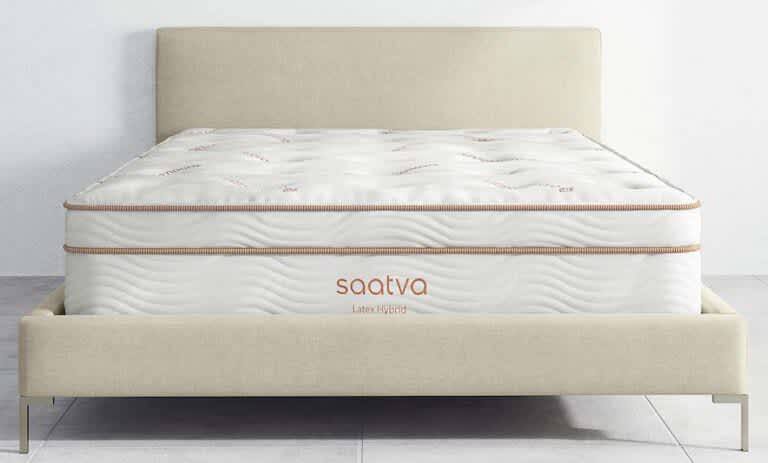
Saatva Latex Hybrid
Luxury latex hybrid with excellent airflow and support.
Key Details
- Who It’s Best For: Side sleepers between 130 and 230 pounds, and back and stomach sleepers weighing up to 230 pounds.
- Feel: Bouncy, breathable surface and extra pushback around the lower back and hips.
- What It’s Made Of: Euro-top comfort system with wool batting and ventilated five-zone latex, followed by pocketed coils with perimeter reinforcement.
- What We Don’t Like: Expensive pricing and a $99 return fee may be a dealbreaker for budget shoppers.
Scoring & Reviews
The following ratings show how suitable this mattress is for different sleeping positions and sleeper weights. These scores are determined by how well the mattress supports and relieves pressure for each sleeper type.
In addition to the hands-on feedback from our team, we conduct a number of quantitative tests in our Test Lab. The below ratings are based on the experience of our testers.
SELECT AN ICON TO VIEW DETAILS:
Motion Isolation
There is considerable motion transfer on the Saatva Latex Hybrid. The coils and latex are bouncy materials, which can cause vibrations to spread when someone moves on the mattress.Many people can sleep through light vibrations, but this mattress isn’t the right fit for people who are easily awakened and share their bed with someone who moves around a lot in their sleep.
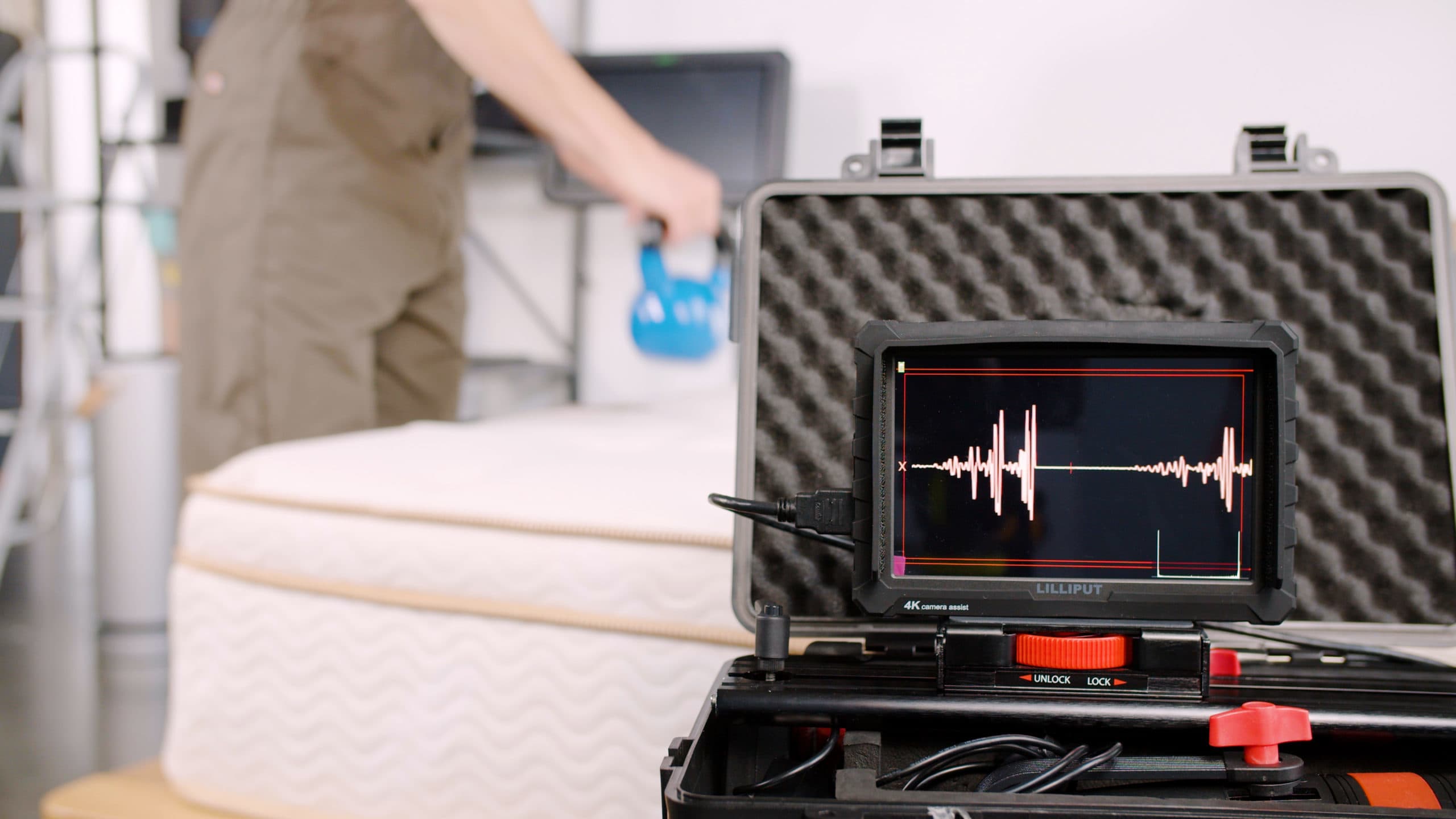
Pressure Relief
The Saatva Latex Hybrid is designed to relieve pressure without closely hugging your body. Instead, the latex just lightly contours in response to your body’s weight.For the majority of sleepers, this amount of pressure relief works to keep the spine aligned and minimize impact with the mattress surface. But it may not suit people who want plushness or deep contouring.

Temperature Control
The Saatva Latex Hybrid excels at temperature regulation. Latex is naturally heat-resistant, and tiny perforations in the latex let airflow whisk away any heat that does start to collect. Air can also flow freely through the coils and the layers made of breathable wool and cotton.

Edge Support
Our testing found reliable edge support from the Saatva Latex Hybrid. It stayed strong around the perimeter when sitting and when lying down.You can feel the latex compress a bit around the edge, but the material quickly bounces back. The thick coils also prevent the edges from buckling.
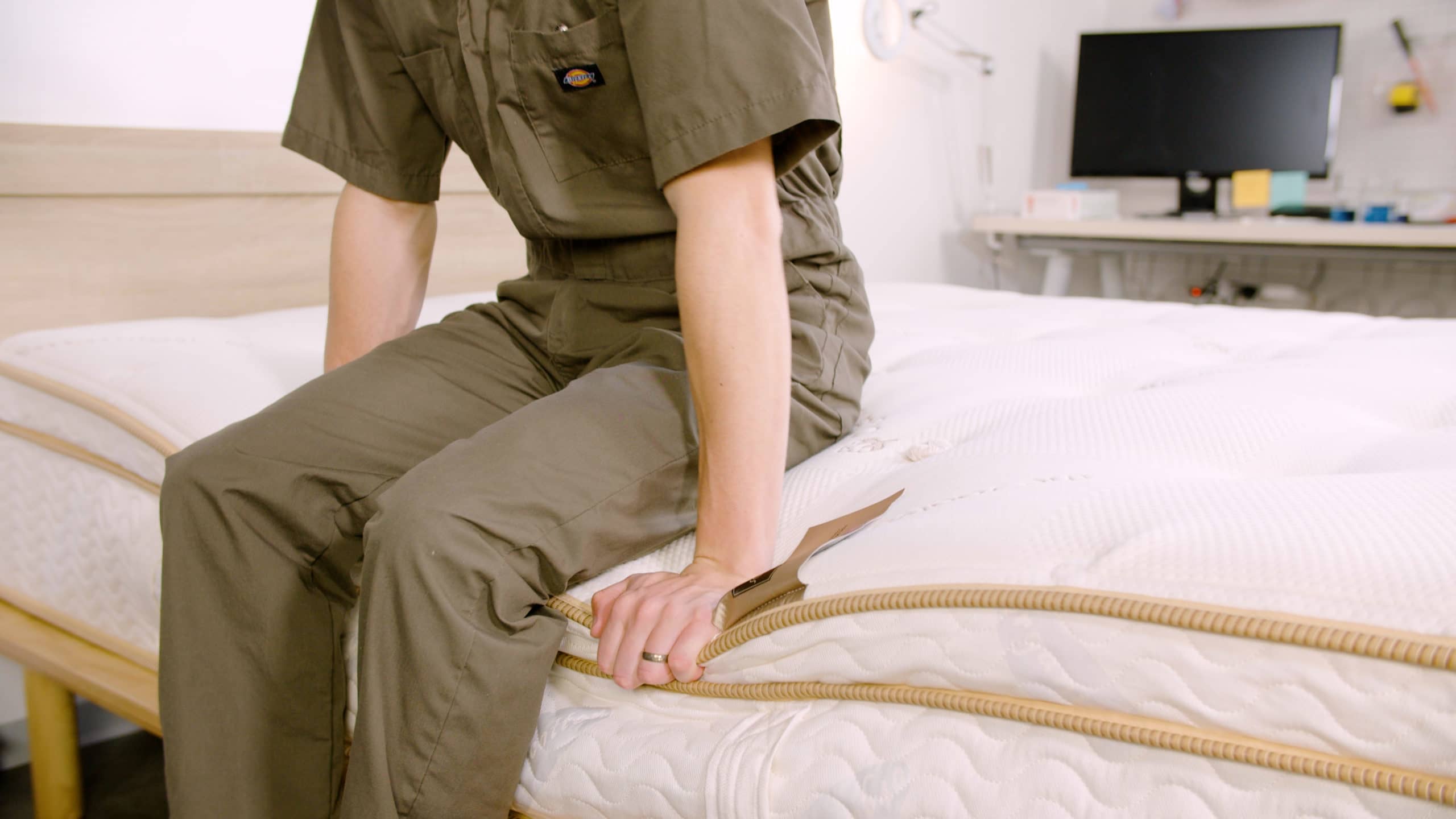
Ease of Movement
Our team found it incredibly easy to move around on the Saatva Latex Hybrid. Talalay latex is remarkably responsive, providing bounce that helps you adjust your body’s position. The underlying coils also add a springiness that facilitates movement.As a result, this bed is a good fit for combination sleepers and others who regularly change how their body is positioned in bed.
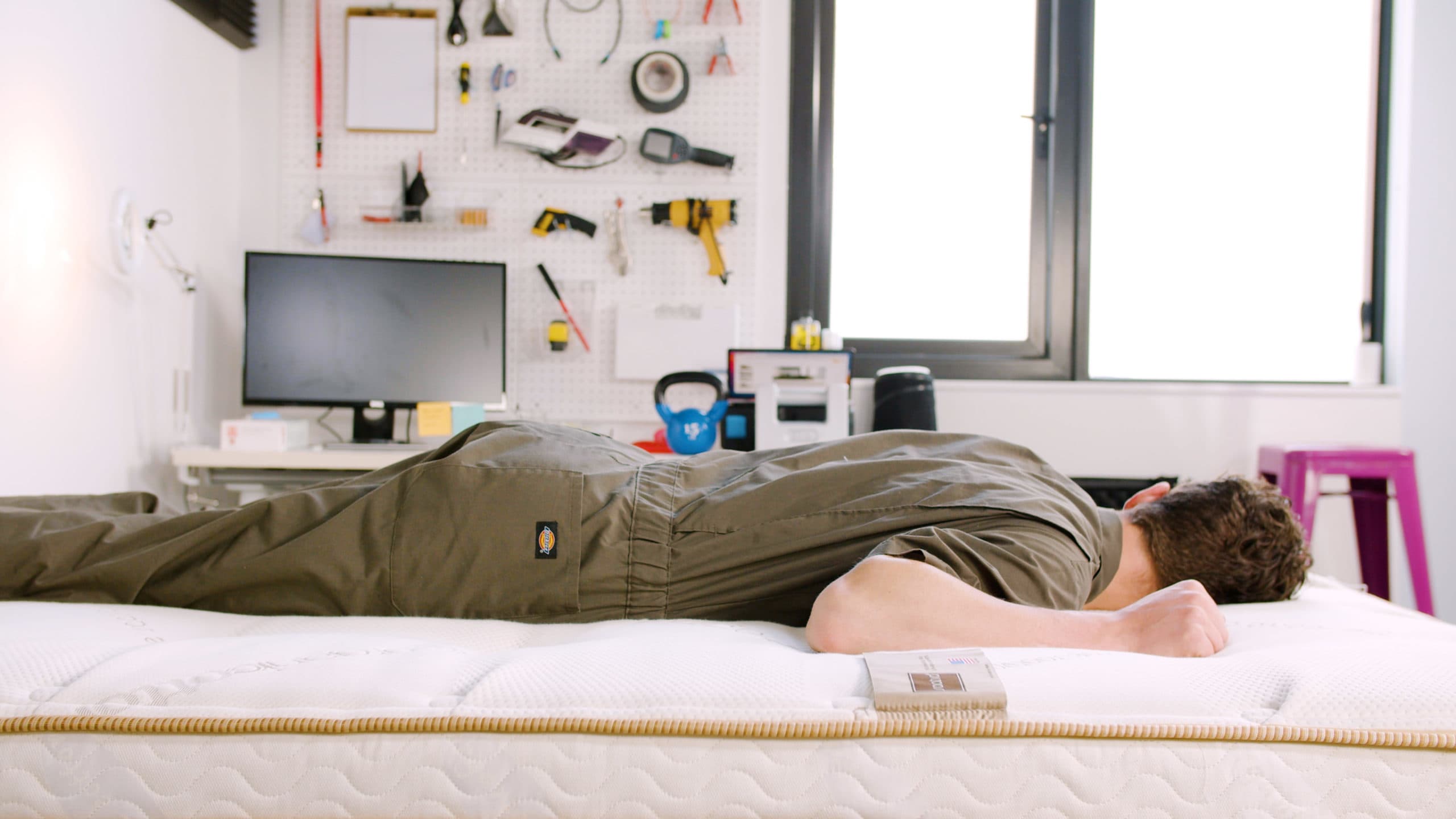
Durability
The Saatva Latex Hybrid is made of very durable materials and should last about 10 years. Latex tends to last a lot longer than foam, and its pocketed coil support core should hold up at least as long as the latex. The only reason this isn’t a perfect score is because it’s made with Talalay latex instead of Dunlop, which is less dense. Nevertheless, this bed should stay with you for a very long time.
Saatva is known for luxurious and eco-friendly sleep products, but the Latex Hybrid takes sustainable design to the next level with a slew of organic, natural, and recycled materials. The mattress also benefits sleepers with multiple zoned layers to reinforce areas of weight concentration while cradling the head and legs.
How It Performed
The Latex Hybrid has a medium firm (6) feel. During our tests, the back and stomach sleepers on our team weighing up to 230 pounds received gentle contouring and sufficient reinforcement – two key factors for comfortable sleep among people who use these positions. Our side sleepers weighing at least 130 pounds also gave the mattress favorable ratings.
Our tests showed better-than-average pressure relief compared to other latex hybrids. We’ve attributed this to the bed’s zoned transitional and support layers, which push back against extra weight around the midsection to prevent excessive sinkage. We also noted steady airflow throughout the mattress and a breathable cover also reduced heat buildup during our temperature control tests.
Best Mattress for Hip Pain: Silk & Snow Organic
Best Mattress for Hip Pain
8.8/10Test Lab Score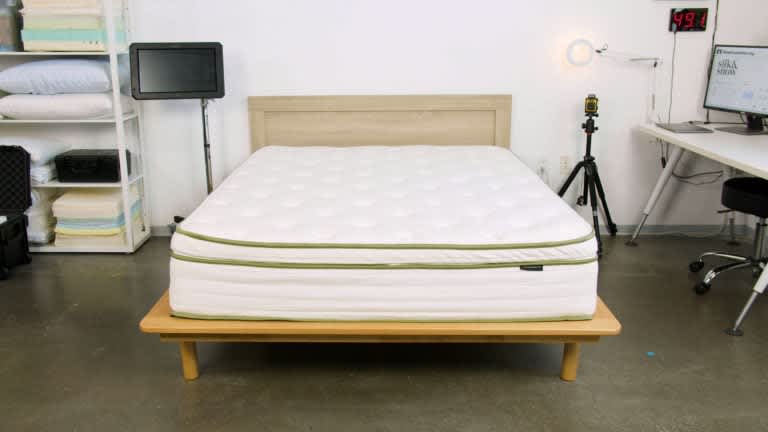
Silk & Snow Organic
An affordable, sustainable latex hybrid that comes in three firmness options.
Key Details
- Who It’s Best For: Side, back, and stomach sleepers across different weight categories – but firmness selection is key to a comfortable night’s rest.
- Feel: All three versions of the mattress feel responsive, but the softest design conforms much more closely than the other two.
- What It’s Made Of:Wool batting and latex comfort layers, followed by zoned pocketed coils in the support core.
- What We Don’t Like: You and your partner may notice motion transfer when the other person moves in bed.
Scoring & Reviews
The following ratings show how suitable this mattress is for different sleeping positions and sleeper weights. These scores are determined by how well the mattress supports and relieves pressure for each sleeper type.
In addition to the hands-on feedback from our team, we conduct a number of quantitative tests in our Test Lab. The below ratings are based on the experience of our testers.
SELECT AN ICON TO VIEW DETAILS:
Motion Isolation
Motion isolation is one of the weaker performance elements of the Silk & Snow Organic.By the nature of its bouncy materials, it tends to create vibrations that move across the mattress surface. Motion transfer is most prominent on the firm (7) model, which has very little material to absorb vibrations.This mattress can work for many couples, but it’s not the best option for people who are likely to be bothered by movements from their partner on the other side of the bed.
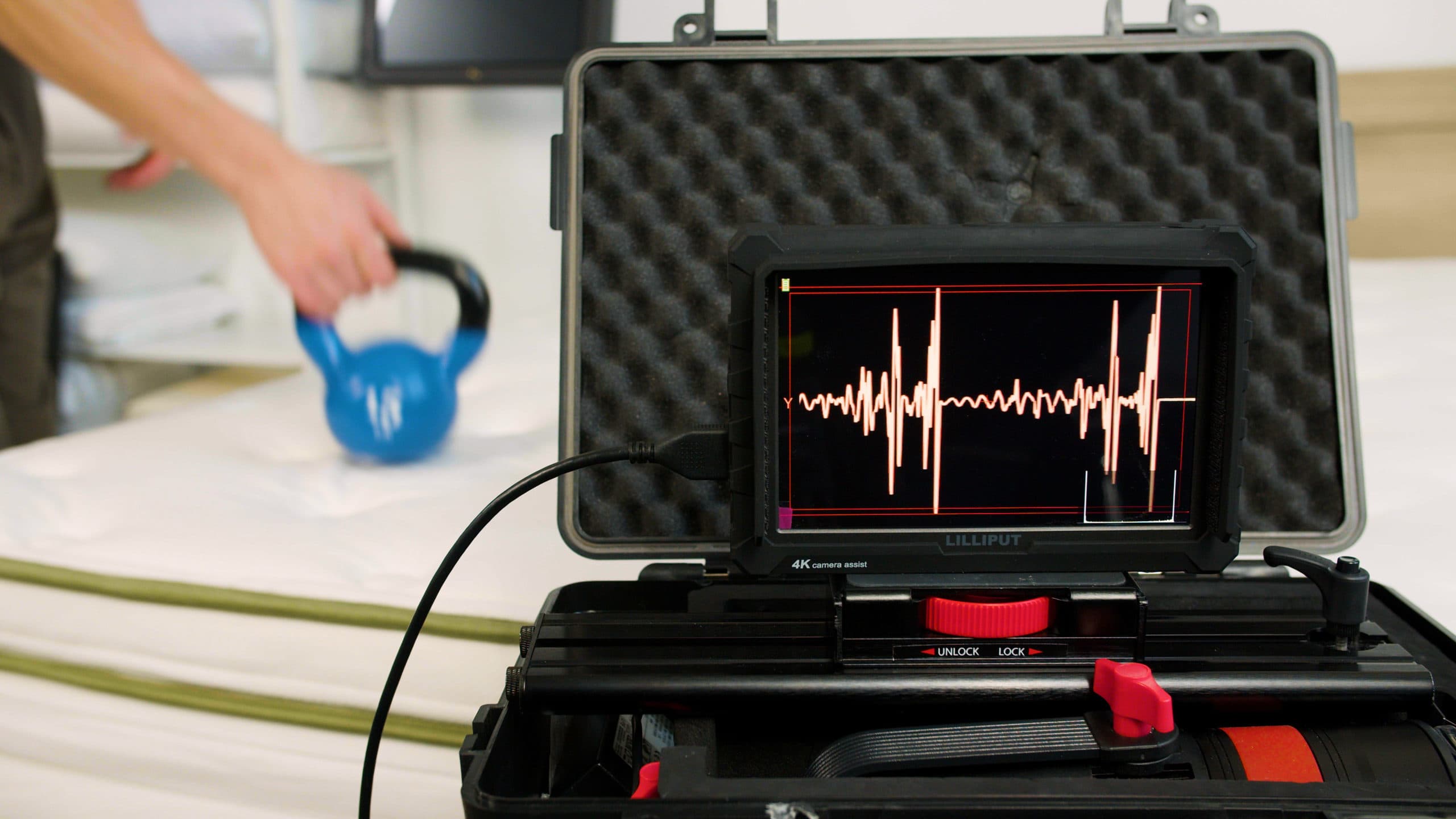
Pressure Relief
Depending on the model, the Silk & Snow Organic Mattress offers average to below-average pressure relief. The models with thicker latex layers have a better ability to cushion the joints and prevent pressure buildup.While the firm (7) model can work well for some back and stomach sleepers, it can create pressure in the lower back, shoulders, and hips of side sleepers.
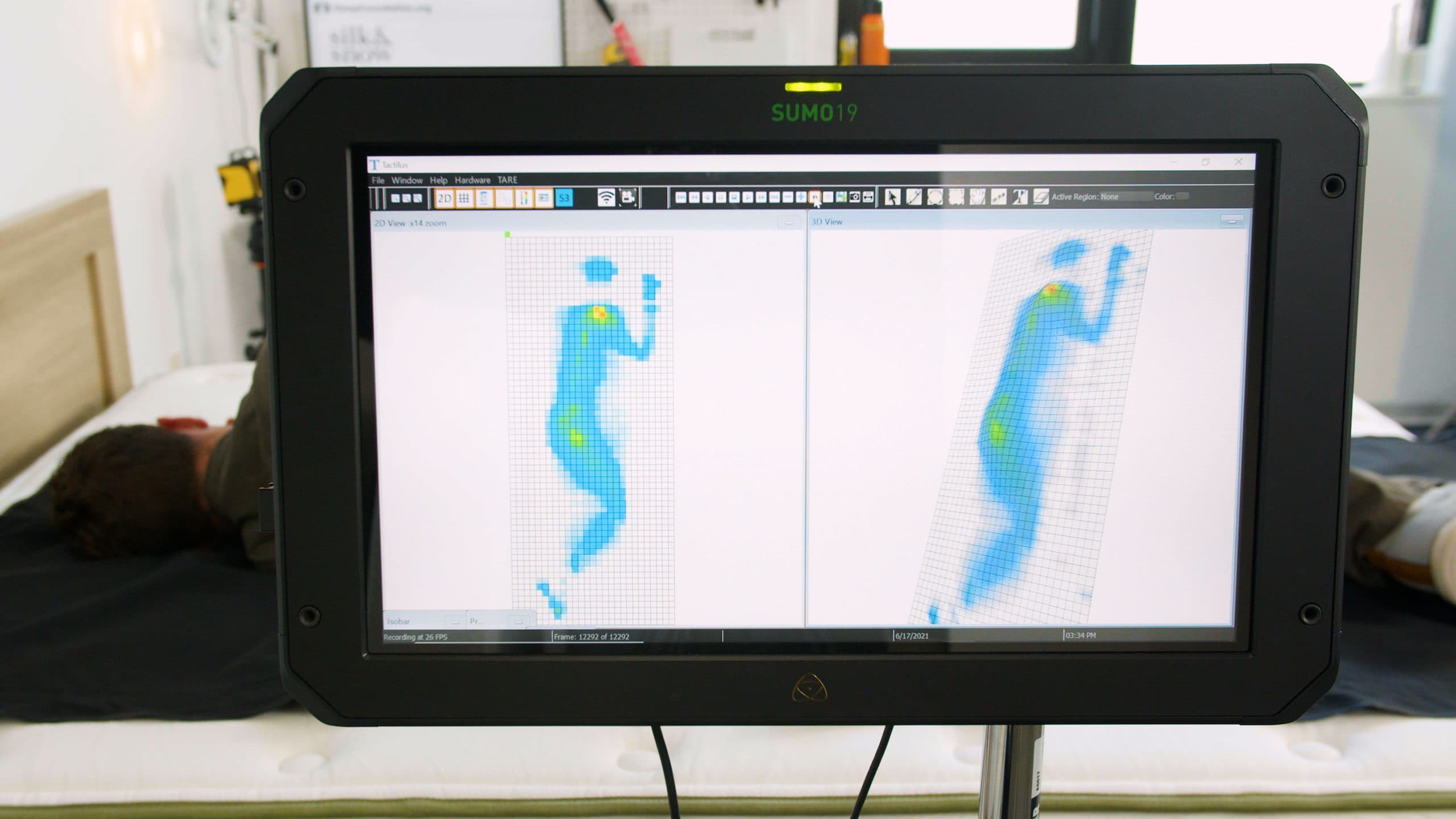
Temperature Control
Temperature regulation is one of the leading strengths of the Silk & Snow Organic Mattress.Latex is highly resistant to heat buildup, and the cotton and wool in the cover are breathable and moisture-wicking. Air can move through the pocketed coils, which gives heat another way to escape instead of collecting in the mattress.Our testing found that the firm (7) model sleeps the coolest, but any of the three models should help prevent hot sleeping.

Edge Support
We found that all three models of the Silk & Snow Organic have an edge that’s sturdy enough to keep you from feeling unstable. The strongest edge is on the firm (7) base model, while the other two versions of this mattress have a bit more compression when you sit or sleep close to the perimeter.
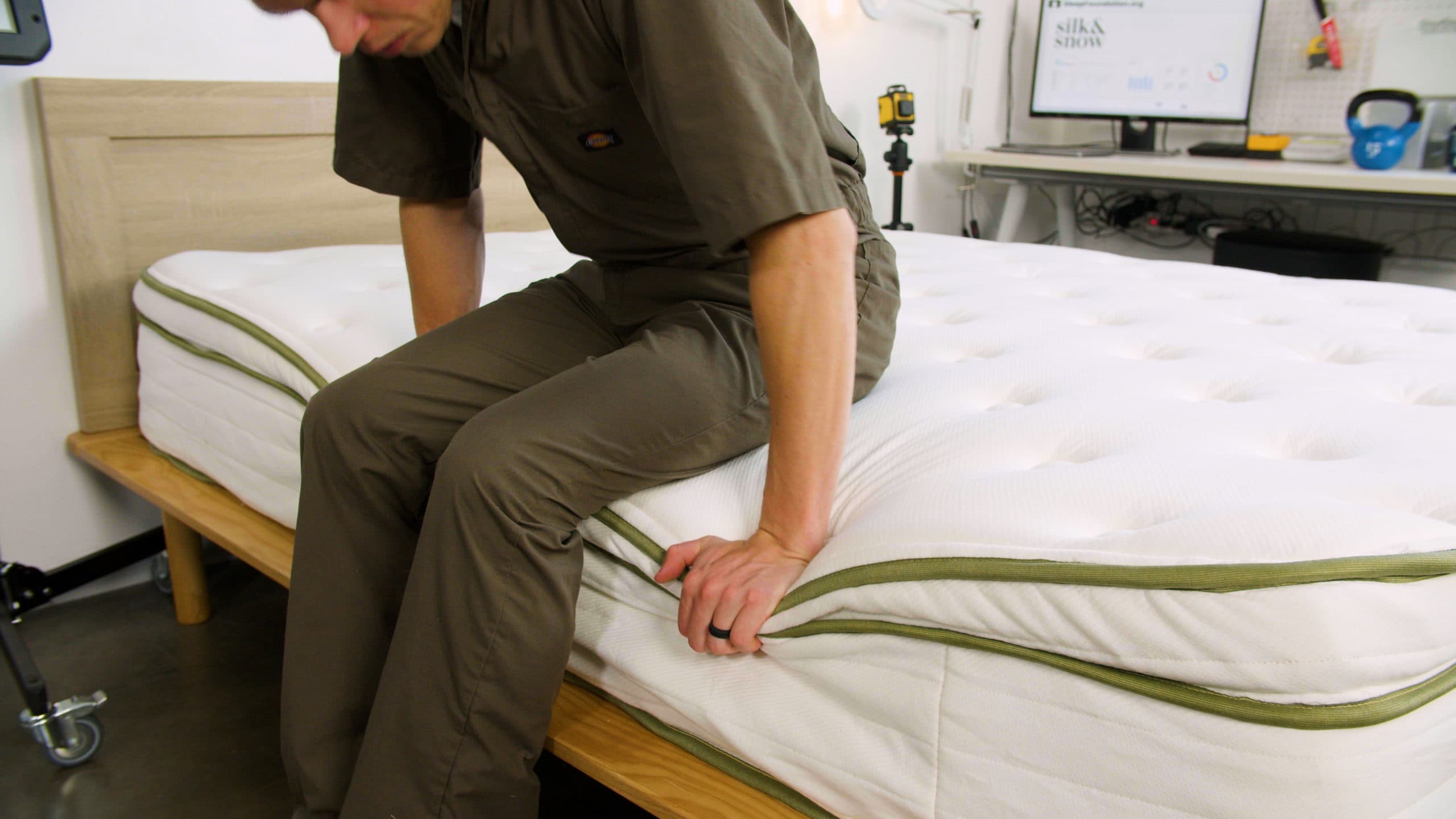
Ease of Movement
Adjusting your sleeping position is easy on the Silk & Snow Organic Mattress. The springy feel of latex is supplemented by the bounce of pocketed coils. These materials keep you from feeling stuck in one spot.Movement is easiest on the firm (7) and medium firm (6) models, but our testing found that any of the three models is suitable to the movement needs of combination sleepers and other people who frequently move around in bed.
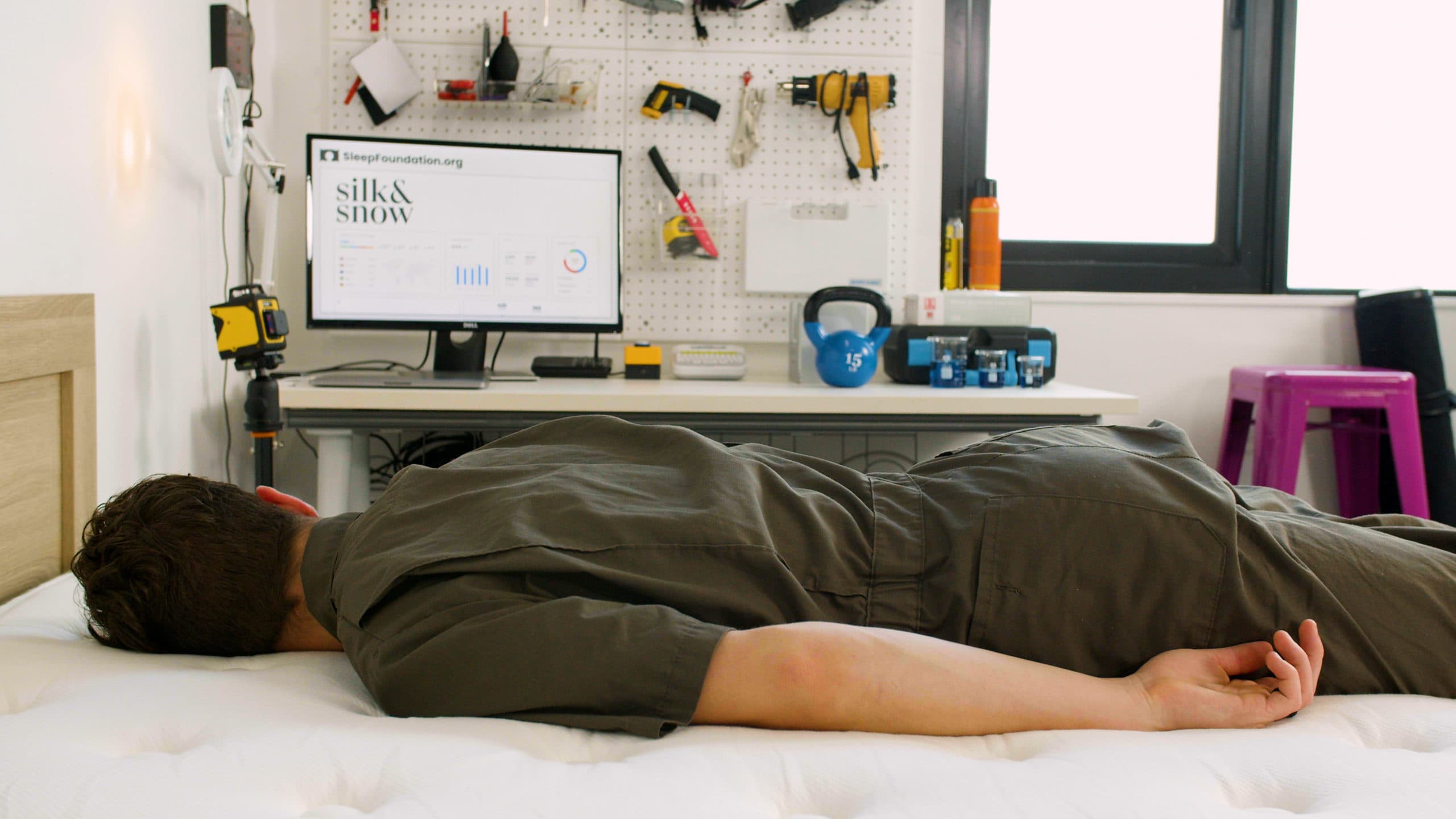
Durability
Since the natural materials used in the Silk & Snow Organic are quite durable, we expect the mattress to last at least nine to 10 years, which is well beyond average. The latex and wool in the comfort layer last considerably longer than foam, and the Dunlop latex is features is more durable than Talalay latex. And the pocketed coils in the support core should resist wear and tear over time.
Many latex hybrids on the market tend to be on the expensive side, but the Silk & Snow Organic is a notable exception. This mattress uses high-quality, organic materials that earned high ratings from our testers while keeping a lower-than-average price-point.
How It Performed
The mattress has a medium firm (6) feel that performed best among our team’s side and back sleepers. Our side sleepers between 130 and 230 pounds and back sleepers weighing up to 230 pounds were particularly impressed with the mattress’ cradling for pressure points and supportive coil system. Stomach sleepers who weigh less than 130 pounds may find the mattress comfortable, but those in other weight categories will probably sink too deeply.
Thanks to the use of breathable components like wool, latex, coils, and cotton, this is one of the coolest mattresses we’ve tested. Our heat guns detected minimal buildup on the surface. We also recommend the mattress if you and your partner value both responsiveness for sex and motion isolation. The latex comfort system absorbed a good amount of movement transfer and noise during our tests. Meanwhile, latex’s naturally bouncy feel made it easy to move across the mattress with little to no restriction.
Best Mattress for Combination Sleepers: Latex for Less Hybrid Latex Mattress
Best Mattress for Combination Sleepers
8.3/10Test Lab Score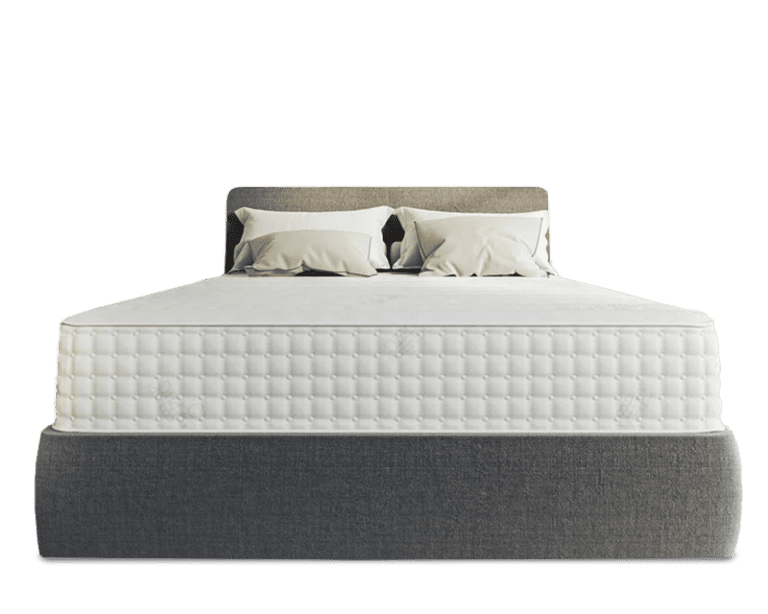
Latex for Less Hybrid Latex Mattress
A reversible latex hybrid with a responsive sleep surface on each side.
Key Details
- Who It’s Best For: The medium (5) design is a good match for side sleepers up to 230 pounds and back sleepers under 130 pounds. People who use these positions and weigh more may prefer the firm (7) model.
- Feel: Latex for Less Hybrid models feel quite bouncy on their surface, but the medium model conforms to a noticeable extent.
- What It’s Made Of: Wool batting and organic latex comfort layers over 8-inch pocketed coils.
- What We Don’t Like: As with other latex hybrids, this model is quite responsive and may disturb sleep for couples.
Scoring & Reviews
The following ratings show how suitable this mattress is for different sleeping positions and sleeper weights. These scores are determined by how well the mattress supports and relieves pressure for each sleeper type.
In addition to the hands-on feedback from our team, we conduct a number of quantitative tests in our Test Lab. The below ratings are based on the experience of our testers.
SELECT AN ICON TO VIEW DETAILS:
Motion Isolation
The Hybrid Latex Mattress has a springy feel, which translates to more vibration spreading across the mattress surface.Although most of our testers didn’t find it to be especially bothersome, it’s easy to notice when your bed partner gets in or out of bed, changes positions, or otherwise moves on their half of the bed.
Pressure Relief
Most sleepers receive adequate pressure relief from the Hybrid Latex Mattress, but it doesn’t offer the same deep contouring you’d get from memory foam. Dunlop latex lightly contours to the body. The other materials also add a touch of tailored support, so most sleepers can get the essential cushioning they need even though the mattress doesn’t have closely conforming materials. Of the two designs, the medium (5) model provides more softness and cushioning than the firm (7).
Temperature Control
Latex is known for resisting heat buildup, so it’s not surprising that the Latex for Less Hybrid Latex Mattress excels in this category. The mattress does not conform closely to your body and allows plenty of cooling airflow to reach your skin.Cotton and wool are naturally breathable, and the pocketed coils enable more airflow than a solid foam core. All said, our testing team found the Hybrid Latex Mattress was a solid option for hot sleepers and people in warm climates.
Edge Support
In our testing, edge support was above average in both the medium (5) and firm (7) models. Our testers were able to comfortably use the entire mattress surface, which included sitting or sleeping near the perimeter.The secure perimeter of the Hybrid Latex Mattress is the result of the durable Dunlop latex in the comfort system and thicker coils lining the edges.
Ease of Movement
With its bouncy feel and minimal sinkage, the Hybrid Latex Mattress won over people on our testing team who prioritize easy movement on a mattress.The firm (7) model rates slightly higher than the medium (5), but both models outperform most foam mattresses in this category.
Durability
The Latex for Less Hybrid should prove substantially more durable than the average bed (about nine to 10 years). Latex and wool are both quite durable, and this hybrid uses Dunlop latex, which is more durable than Talalay latex. As is generally the case with hybrid beds, the coil support core should also hold up well to heavy use.
The Latex for Less Hybrid Latex Mattress is a latex hybrid available in two firmness levels: medium (5) and firm (7). Both have an exceptionally responsive feel that earned high ratings in our ease of movement tests. This makes the mattress a great choice if you tend to toss and turn at night, and it holds a lower-than-average price-point compared to other mattresses made with organic materials.
How It Performed
Performance differs slightly depending on the firmness level you choose. The mid-range feel earned decent marks across sleeping position preferences, but it especially appealed to side sleepers between 130 and 230 pounds. Back and stomach sleepers weighing less than 130 pounds should also feel supported. Meanwhile, our back and stomach sleepers in other weight categories enjoyed the firmer model’s even sleep surface. Side sleepers weighing more than 230 pounds should also feel comfortable.
All models have a responsive feel and earned high ratings during our edge support tests. These mattresses are great choices if you and your partner prefer a bouncy surface for sex that’s easy to move across. Latex is a naturally breathable material on its own, but the addition of a cotton cover and wool comfort system further encourage airflow. Our temperature control tests found little to no heat retention on the surface.
Best Mattress for Airflow: Avocado Green Mattress
Best Mattress for Airflow
9.2/10Test Lab Score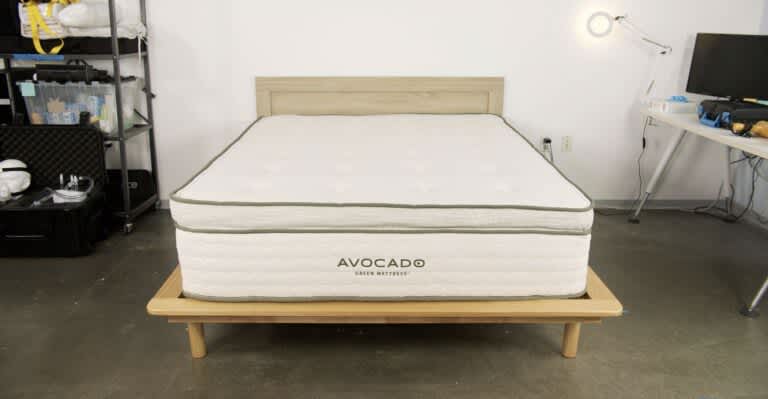
Avocado Green Mattress
A breathable, responsive latex hybrid available in three firmness levels.
Key Details
- Who It’s Best For: Side and back sleepers, hot sleepers, and people with lower back pain.
- Feel: Customers can choose from medium (5), medium firm (6), and firm (7) models.
- What It’s Made Of: Standard Avocado Green mattresses contain organic wool batting and Dunlop latex comfort layers over a zoned coil system with perimeter reinforcement and organic wool batting in the base layer. The cover is composed of organic cotton.
- What We Don’t Like: The mattress is quite heavy and can be difficult to lift and move. People who need extra cushioning to sleep comfortably will need to upgrade and pay extra for the pillow-top or box-top designs.
Scoring & Reviews
The following ratings show how suitable this mattress is for different sleeping positions and sleeper weights. These scores are determined by how well the mattress supports and relieves pressure for each sleeper type.
In addition to the hands-on feedback from our team, we conduct a number of quantitative tests in our Test Lab. The below ratings are based on the experience of our testers.
SELECT AN ICON TO VIEW DETAILS:
Motion Isolation
Pressure Relief
Temperature Control
Edge Support
Ease of Movement
Durability
The Avocado Green Mattress is a hybrid model that features Dunlop latex, the most supportive comfort layer choice available (more so than mattresses that use memory foam or Talalay latex). In addition, it uses an 8-inch layer of pocketed coils and has a firm feel, which contributes to a longer-lasting mattress life of around 10 years.
Many organic mattresses excel at airflow and breathability, but the Avocado Green stands out from the composition because every material component regulates your temperature in some way. Moisture-wicking wool forms a fire barrier beneath the surface, the cover is made of cool-to-the-touch organic cotton, and both the ventilated latex and pocketed coils promote internal air circulation to help the mattress maintain a comfy temperature inside and out.
How It Performed
For side and back sleepers on our team between 130 and 230 pounds, the firm (7) standard and medium firm (6) pillow-top Avocado Green models offered a comfy combination of surface-level cushioning, mellow bounce, and sturdy multi-zoned support. Side sleepers over 230 pounds and back and stomach sleepers under 130 pounds also enjoyed the pillow-top design. For side sleepers under 130 pounds, the medium (5) Box-Top Avocado Green should supply ample cushioning to minimize pressure buildup along the spine.
Like many competing latex hybrids, the Avocado Green excels at temperature control. Moisture-wicking wool batting, which provides extra cushioning and doubles as a fire barrier, helps the surface stay cool and dry. The latex is ventilated to push airflow close to the top of the mattress, while the coils also circulate air throughout the mattress interior. Other performance areas where the Green earned high marks include edge support and ease of movement.
Best Mattress for Couples: My Green Mattress Kiwi Organic Mattress
Best Mattress for Couples
8.2/10Test Lab Score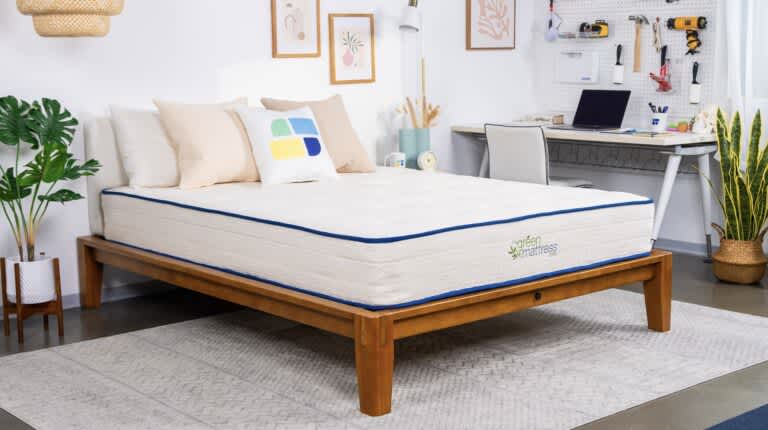
My Green Mattress Kiwi Organic Mattress
Soft latex hybrid that sleeps cool and has a reinforced perimeter.
Key Details
- Who It’s Best For: Side sleepers up to 230 pounds and back and stomach sleepers under 130 pounds.
- Feel: The medium (5) design offers a balance of light cushioning, mellow bounce, and sturdy support.
- What It’s Made Of: Wool batting and Dunlop latex in the comfort system, followed by a zoned pocketed coil support core.
- What We Don’t Like: Potentially not firm enough for people weighing more than 230 pounds.
Scoring & Reviews
The following ratings show how suitable this mattress is for different sleeping positions and sleeper weights. These scores are determined by how well the mattress supports and relieves pressure for each sleeper type.
In addition to the hands-on feedback from our team, we conduct a number of quantitative tests in our Test Lab. The below ratings are based on the experience of our testers.
SELECT AN ICON TO VIEW DETAILS:
Motion Isolation
Our motion isolation testing found subpar results for the Kiwi Organic Mattress. In large part, this was to be expected given its construction with latex and innerspring coils.These bouncy materials allow vibrations to reverberate across the mattress surface. In practice, this means that you notice when a bed partner moves on the mattress or gets into or out of bed. Although most people aren’t bothered by some motion transfer, it can be disruptive to anyone who wakes up easily.
Pressure Relief
The Kiwi Organic delivers pressure relief that is roughly average. It has enough cushioning to prevent painful impact with the mattress surface, but it doesn’t mold to the body in the way that some mattresses can.Based on our testing, the Kiwi Organic offers the best pressure relief to side sleepers under 230 pounds and back sleepers under 130 pounds. It’s less supportive for people over 230 pounds and anyone who wants a mattress with deep contouring.
Temperature Control
We found that the Kiwi Organic provides standout temperature control, especially for a mattress that has a medium (5) firmness level.Our testing team could sleep on this mattress with virtually no heat buildup. Cotton and wool are breathable and moisture-wicking. Latex is naturally resistant to heat retention. And the coils have plenty of room for ventilation so that heat can flow out of the mattress.
Edge Support
Above-average edge support provides a degree of stability across the entire surface of the Kiwi Organic. The sturdy coils are reinforced around the perimeter, which protects against deep sinkage. The responsiveness of latex also helps prevent any sense that you are going to accidentally roll out of bed.
Ease of Movement
People on our testing team who switch between different sleeping positions praised the ease of movement on the Kiwi Organic.The buoyant latex and bouncy coils facilitate smooth and resistance-free movement on the mattress surface. This makes the Kiwi Organic appealing to anyone who changes positions to get comfortable.
Durability
This organic hybrid mattress is built for both comfort and durability. What it has going for it in terms of longevity is that it uses Dunlop latex in its comfort layer, which is the highest density option. It also has 8-inch pocketed coils in the support core and reinforced edges. Because it isn’t very firm, it may sink in over time, but you should still get around eight solid years.
The Kiwi Organic Mattress from My Green Mattress is a hybrid model made with materials that are known for their natural cooling properties. The medium (5) feel and zoned coil system ensure even the heaviest areas of your body receive adequate support.
How It Performed
Our hands-on tests show the Kiwi Organic Mattress is best suited to sleepers under 130 pounds, regardless of sleep position. It also performed very well for side sleepers up to 230 pounds. We noticed ample pushback around the middle due to enhanced lumbar support in the coils, as well as along the perimeter where the lowest-gauge coils are located. That said, the surface was still adaptive and never felt overly firm. The responsive feel and reinforced perimeter helped the Kiwi Organic ace our edge support and ease of movement tests.
Video: We Tested the Best Organic Mattresses – Here Are Our Favorites
Watch our video below to learn more about our lab’s top picks for best organic mattress.
What Makes a Mattress Organic?
Organic is a buzzword across so many industries, but here’s what it actually means when you’re seeing it used to describe a mattress: A material is considered organic if it’s natural and produced without the use of chemical pesticides, fertilizers, antibiotics, or growth stimulants.
Common organic materials that work well in mattresses include latex, wool, and cotton. For a mattress to be truly organic, I also check that it doesn’t use any non-organic additives, such as chemical adhesives to join the layers together.
Depending on the type of mattress, there may be certain components that cannot be organic, such as metal coils. Each person has their own criteria, but I’ve included some of these mattresses on my list if those materials are responsibly sourced, such as in the case of recycled steel.
Organic and Eco-Friendly Certifications
One of the first things I always look for when considering an organic mattress is the credentials. You’d be surprised how many companies talk the talk without walking the walk, so that’s why I focus on mattresses certified by third-party organizations.
These certifications generally indicate that the mattress has been subjected to a rigorous testing process by an outside organization, and they’re a good way to weed out the brands providing false or misleading marketing claims.
- Global Organic Textile Standard (GOTS) and Global Organic Latex Standard (GOLS): These are the two gold-standard certifications for organic mattresses. GOTS certifies that textile products, such as those containing cotton or wool, contain a minimum of 70% organic fibers and meet strict criteria for the treatment of their workers and sustainable manufacturing practices. Similarly, GOLS requires that natural latex products meet a minimum threshold of 95% organic materials and establishes criteria for fillers and harmful substances. You’ll often see these certifications together, as GOLS requires that textile components meet GOTS criteria.
- OEKO-TEX Standard 100: Textile products must be tested and found to be free of a list of more than 100 harmful substances.
- CertiPUR-US: Foams used in mattresses must be free of certain harmful emissions, such as heavy metals and ozone depleters. This certification is meant for synthetic foams like polyfoam and memory foam, so I would be wary if you see it on a mattress that purports to be organic. Also, keep in mind that the certification only covers the foam in the mattress, not the cover.
- GREENGUARD: GREENGUARD tests for volatile organic compounds (VOCs) that are released into the air after manufacturing. There are two levels of GREENGUARD certification, with GREENGUARD Gold being more stringent.
- eco-INSTITUT: The eco-INSTITUT is an internationally recognized German organization that checks for harmful emissions.
Mattress Materials That Are Organic
Materials used in organic mattresses must originate from plants or animals. Unless you have the budget to fork out tens of thousands of dollars for a silk-and-horsehair mattress, the materials you’re most likely to see in an organic mattress include natural latex, cotton, wool, and hemp.
Natural Latex
Natural latex is a springy substance made from the milky-white liquid of the rubber tree (kind of like sap, but not technically). This liquid is cured, whipped into a froth, then poured into molds and baked, typically in a mold with pincore holes that help encourage airflow through the mattress.
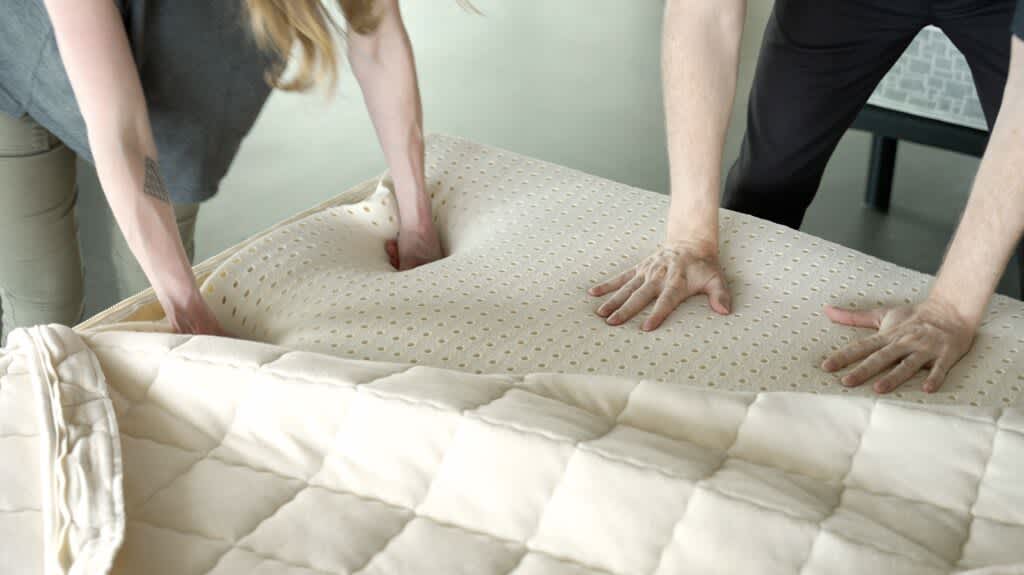
Latex is a versatile material that you’ll see in both the comfort and support layers of a mattress. It can be produced using either the Dunlop or the Talalay method.
- Dunlop: Dunlop latex is mixed and then baked. As it bakes, the heavier sediment moves to the bottom. As a result, one side of the mattress layer is often a little denser than the other, giving a sensation of increasing firmness as you sink into the bed.
- Talalay: Talalay latex is expanded in a vacuum and then flash-frozen before baking, resulting in a more uniform final product. Talalay latex often has a lighter, springier feel, but it requires additional fillers to produce, so Talalay latex can only ever be 95% organic at most.
I recommend natural latex for people who value breathability and gentle bounce in their mattress. But beware! Not all latex is natural, and not all natural latex is organic. Before buying a latex mattress, double-check its credentials.
Synthetic latex made from petrochemicals has a strong, unpleasant odor and is nowhere near as comfortable (believe me, I know). Companies often blend a portion of natural and synthetic latex, so if you want to know you’re buying the good stuff, that’s where the third-party certifications come in.
Cotton
On the surface, cotton seems like an eco-conscious choice. After all, this soft, breathable textile is made from the fibers of a plant: the cotton tree. What could be more natural than that? But cotton is actually quite a resource-intensive crop, and its production process often includes a number of harsh chemicals.
If you’re worried about the quality of cotton used in your mattress cover, the best you can do is look for certifications like GOTS, which provides assurance that it’s free of chemical pesticides and other harmful substances.
Wool
Wool fulfils several roles in an organic mattress. Thanks to its naturally crimped form, sheep’s wool is resilient and makes a great cushioning layer for the comfort section. Additionally, wool doesn’t easily catch fire or melt onto your skin, so it’s an eco-friendly alternative to synthetic flame retardants.
The use of wool in organic mattresses is a little contentious with people who prefer to avoid animal by-products. Personally, I try to look for wool that’s not only GOTS-certified but also holds a certification like the Responsible Wool Standard, which looks out for the sheep’s welfare.
Hemp
Hemp is not as commonly used in mattresses, but this fabric derived from the Cannabis sativa plant is sometimes included among the top layers for its breathability. Hemp is also attractive for its eco credentials, as it’s a fast-growing crop that requires less water than cotton.
Why Should You Consider Buying an Organic Mattress?
For me, organic mattresses tick a lot of boxes. They’re sustainable, they’re naturally responsive and breathable, and they outlast most of their competitors. They’re a particularly good option for people who seek out products that are non-toxic, because many non-organic mattresses contain harmful substances, such as:
- Volatile Organic Compounds (VOCs): VOCs refer to chemicals that are released into the air from manufactured products, especially those containing synthetic materials. VOCs often produce an unpleasant odor and some of them are thought to have negative long-term health effects.
- Per- and Polyfluoroalkyl Substances (PFAS): Also known as “forever chemicals,” PFAS are another group of chemicals that remain for many years in the environment. These chemicals can make their way into our food and our bloodstream, with potential side effects on health.
- Chemical Flame Retardants: To meet fire safety laws, mattresses may be coated with chemicals that have been linked to hormone disruption, cancer, and developmental problems in children. In contrast, organic mattresses use other methods, such as wool flame barriers, to meet requirements without using chemicals.
- Fiberglass: Fiberglass is a man-made material consisting of thin glass fibers that’s sometimes added to mattress covers because it’s fire-resistant. If you accidentally come in contact with it, it can irritate your skin and eyes and aggravate asthma symptoms.
- Polyurethane: Polyurethane foam, known as polyfoam or its close cousin memory foam, is a synthetic material made from petrochemicals. All polyurethane emits VOCs as an unavoidable byproduct of the production process.
Who Are Organic Mattresses Ideal For?
Eco-Friendly Shoppers
If you’re uneasy with the idea of your mattress lasting forever in a landfill, an organic mattress presents an attractive alternative. In addition to using biodegradable materials, organic mattress manufacturers tend to pay attention to other aspects of their supply chain as well, often going the extra mile to ensure sustainable manufacturing processes and worker well-being.
People Who Are Sensitive to Chemicals
By definition, an organic mattress should contain little to no synthetic chemicals, so there’s no need to quarantine the mattress in another room for off-gassing or worry about skin irritation. While natural wool and latex can have their own odor, I’ve found it’s nowhere near as unpleasant as synthetic off-gassing, and these materials shouldn’t pose any health issues unless you’re allergic to latex.
Kids
If chemicals are bothersome for adults, they can be extra-dangerous for children, whose still-developing bodies are more sensitive to their negative effects. We all want to keep our kids safe, and an organic mattress is one way to minimize chemicals in the bedroom.
Hot Sleepers
Most organic materials used in mattresses are inherently breathable because nature likes to breathe, too! Latex, wool, and cotton are all great options if you tend to sleep hot, with wool often included in the top layers to help wick away sweat on those long summer nights.
Shoppers Who Prioritize Durability
Natural materials are often inherently more durable than their synthetic counterparts. Compared with polyfoam or memory foam, organic latex takes much, much longer to sag or form permanent body impressions. Additionally, organic mattresses that are hand-tufted aren’t vulnerable to breakdown of glues and adhesives holding the layers together.
Sleepers Who Need More Support
Latex and latex hybrid mattresses tend to provide above-average support compared to mattresses with polyfoam cores. I’ve found this makes them ideal for stomach sleepers and those weighing more than 230 pounds.
Combination Sleepers
Wool and latex are both quick to regain their original shape, and they don’t give you that quicksand feeling that sometimes occurs with memory foam. If you like to switch up your sleeping position during the night, an organic mattress is great for facilitating movement.
Who Are Organic Mattresses Less Than Ideal For?
Shoppers on a Budget
Natural materials cost more to manufacture, and organic certifications cost money. These factors mean that organic mattresses are typically sold at a premium.
People With Latex Allergies
If you have a latex allergy, you may prefer to avoid natural latex, and this will severely limit the selection of organic mattresses available to you. Many companies claim that they wash away the allergy-causing proteins during the manufacturing process, but this is definitely something you should talk to your doctor about before considering a latex bed.
How to Choose the Best Organic Mattress
When you’re shopping for an organic mattress, I recommend zeroing in on a few key features. Along with factors that influence the feel of the mattress, third-party certifications and brand reputability are extra important in this field. It’s also a good idea to read the fine print on company policies like the sleep trial and warranty.
Keep an Eye out for Certifications
Since mattress companies tend to charge more for organic models, I’d start by weeding out mattresses that don’t back up their claims with trusted certifications.
Mattress brands often seek to appeal to eco-conscious shoppers by using vague words like “green” or “sustainable” without saying what exactly makes them green or sustainable. Third-party certifications are a good way to verify that mattresses really are made with organic materials and don’t contain harmful chemicals.
Find Reputable Brands
Transparency is always important when mattress shopping, but it’s especially key when shopping for an organic mattress. It’s a good sign if the brand is willing to share specific details about the mattress construction, such as the density and type of latex or the source of the wool and the cotton. And while brand name isn’t everything, choosing a well-known brand can give you some peace of mind.
Companies that truly care about minimizing their carbon footprint generally pay attention to other details as well. I like to favor companies who go above and beyond by offsetting their carbon emissions, reducing the amount of plastics in their packaging, or donating a portion of their earnings to environmental causes.
Support and Firmness
Mattress firmness determines how far you sink into a mattress, which affects spinal support. The right firmness for you depends on your body weight, habitual sleeping position, and personal preference.
On a firmness scale of 1 to 10 with 10 being the firmest, most people prefer a mattress between 5 and 7, which helps support healthy posture without causing uncomfortable pressure points. Most of the organic mattresses I’ve tested are on the firmer side of average.
Contouring and Pressure Relief
Contouring is the technical term for that “hug” feeling we all associate with memory foam. Mattresses with close contouring tend to provide better pressure relief, especially for side sleepers.
It could be said that this is one area where organic mattresses have a reputation for falling short of the mark, because latex provides less of a hug and more of a gentle bowing. But during our testing, I was pleasantly surprised to see more than one organic mattress successfully leverage layers of wool or cotton batting to protect against pressure points, even when I rolled over onto my side.
If you’re willing to accept Talalay latex in your mattress — remember, the Talalay method uses a small amount of non-organic fillers — this type of latex usually offers better pressure relief.
Pricing, Sleep Trials, and Warranties
You can expect to pay a little more for an organic mattress, with the average organic queen setting you back around $2,000. I find it’s often worth the investment, since organic mattresses tend to outlast mattresses made with synthetic foams. If you’re willing to settle for a simpler design, you may find some models for around $1,000.
Most online mattress brands offer a sleep trial anywhere between 90 and 365 nights, during which you can sleep on the mattress in your own home and return it for a refund if you find it’s not for you.
After the sleep trial ends, you’re still protected by the warranty, which guarantees that the manufacturer will replace or repair any manufacturing defects that arise during a specified period of time, usually between 10 and 25 years.
A quick word on shipping: Let me tell you, an all-latex mattress is heavy. If you have limited mobility or you just feel like saving your back, this is one case where I would advise spending a bit more to get White Glove delivery and have someone else handle the setup.
Other Eco-Friendly Mattress Shopping Tips
Still on the fence about an organic mattress but want to do your part for the planet? There are lots of other ways to be eco-conscious when revamping your sleep space.
Lower the Impact of Other Mattress Materials
Even if a mattress doesn’t qualify as fully organic, it’s still worth paying attention to the individual components. Materials like upcycled steel or fabrics produced with a closed-loop process still play a role in helping the planet. The cover is another area where there’s lots of opportunity to go natural: Choose cotton or Tencel over polyester and avoid chemical flame retardants and fiberglass.
Memory Foam and Polyfoam
Memory foam and polyfoam are typically made with petrochemicals, but if you do some hunting, you’ll find that some brands are starting to replace a portion of these chemicals with plant-based oils.
Upcycled Steel
Using recycled steel for the metal coils in a hybrid mattress can help reduce its overall environmental footprint.
Synthetic Latex
Synthetic latex is made with petrochemicals and is not considered eco-friendly. If a fully organic mattress is out of your price range, you may consider looking for blended latex, which offsets a portion of the chemicals with natural latex.
Invest in Organic Bedsheets, Pillows, and Blankets
If you’re not quite ready to splurge on an organic mattress, a great alternative is to start with organic bedding. Look for organic bedsheets, organic pillows, or an organic mattress topper, which gives you the breathability and responsive feel of wool or latex without having to buy a brand new mattress.
Recycle or Donate Your Old Mattress
Donating or recycling your old mattress can give a new life to the materials and minimize what ends up in the landfill. If your mattress still has some good years of use left in it, you may be able to give it to a friend or donate it to a local charity. If it’s lost its supportive capabilities, most municipalities have local associations that offer mattress recycling services.
How to Dispose of a Mattress – Video
Watch the video below to explore different ways to dispose of your mattress.
How We Test: Your Comfort Is Our Science
Our industry-leading product testing team cares deeply about improving your sleep. In our Seattle-based Test Lab, we use an objective, hands-on process to evaluate mattresses across performance categories. And since a bed’s comfort and feel depend largely on body weight and sleeping position, our testing team represents a wide range of body types, sleep positions, and comfort preferences.
The following are the main factors that inform our performance ratings. Our ultimate goal is to ensure you have all the information you need to make the best purchase decision for you.
Construction analysis: We look at the bed’s price point, materials, firmness options, comfort and support systems, cooling technology, as well as brand reputation, and then we perform a detailed analysis that measures performance across six different categories to arrive at an overall score.
Quantitative product testing: During these hands-on lab tests, our team uses various tools and technology to evaluate a bed’s performance against motion isolation, pressure relief, temperature control, ease of movement, edge support, and potential for odor emissions. We use the outcomes from these tests to calculate a score for each category.
Field testing: Our field testers sleep on mattresses in their own bedrooms. After a few weeks of at-home testing, each field tester provides a detailed analysis of how the mattress performs, including what they like and dislike about the bed.
User feedback: We draw insights from surveys, sleep stories, and customer reviews to extract themes, fine-tune our ratings, and better understand how each product performs over time in a real-world setting.
How We Determine Our Overall Scores

To determine a mattress’s overall score, we assign weighted percentages to performance categories based on how important they are to the individual sleep experience. For instance, areas like pressure relief and temperature control tend to matter more to people than something like edge support, and because more people sleep on their side and back than on their stomach, we weigh those positions more heavily.
Performance Categories
Motion Isolation
This is how much vibration a mattress absorbs when someone moves around on it. We measure this with a vibrometer, and the results help determine whether you’ll be woken up when your bed partner rolls over or gets in or out of bed.
Temperature Control
No one wants to wake up clammy and hot, so we perform temperature tests with a heat gun to see how much a mattress heats up and how quickly any built-up heat dissipates.
Pressure Relief
Pressure relief is particularly important for people with chronic pain, but it’s also an essential factor for side sleepers and heavier people. We use pressure mapping technology that shows just how much impact occurs around the heavier parts of the body.
Ease of Movement
This category reflects how easy it is to move around on the bed’s surface. Materials like latex tend to get higher scores for ease of movement. As with testing edge support, we use kettlebells to determine how deeply a mattress compresses and how quickly it bounces back.
Edge Support
Mattresses with strong edge support provide a more dependable and reliable sleep surface. We perform tests measuring how much the edges sink when you sit or lie down near the perimeter and how long it takes for the edge to return to its original shape.
Off-Gassing
As I mentioned in the article above, a mattress that has been compressed to ship in a box can release unpleasant chemical odors due to volatile organic compounds (VOCs). We analyze how strong the smell is and how long it takes to fade away.

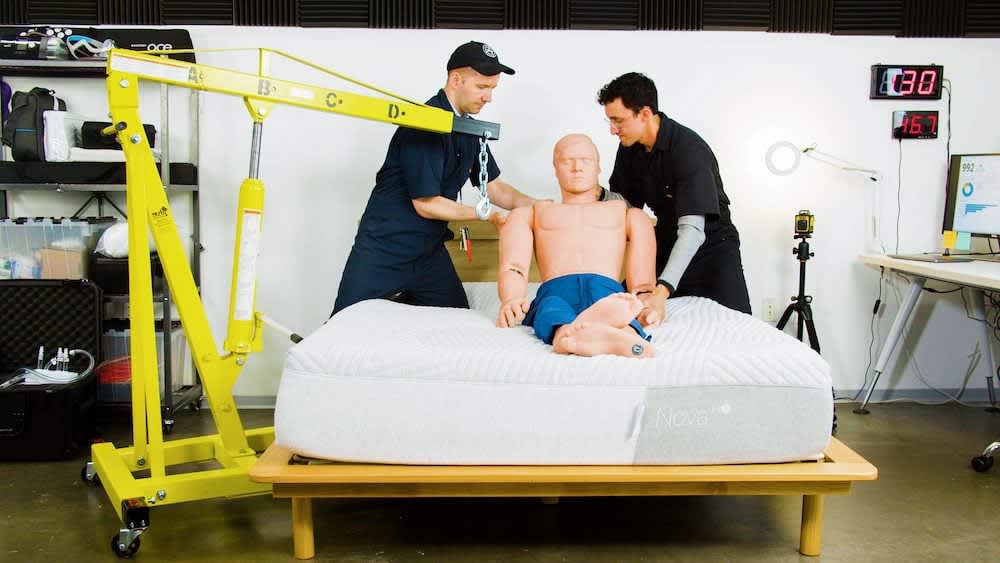

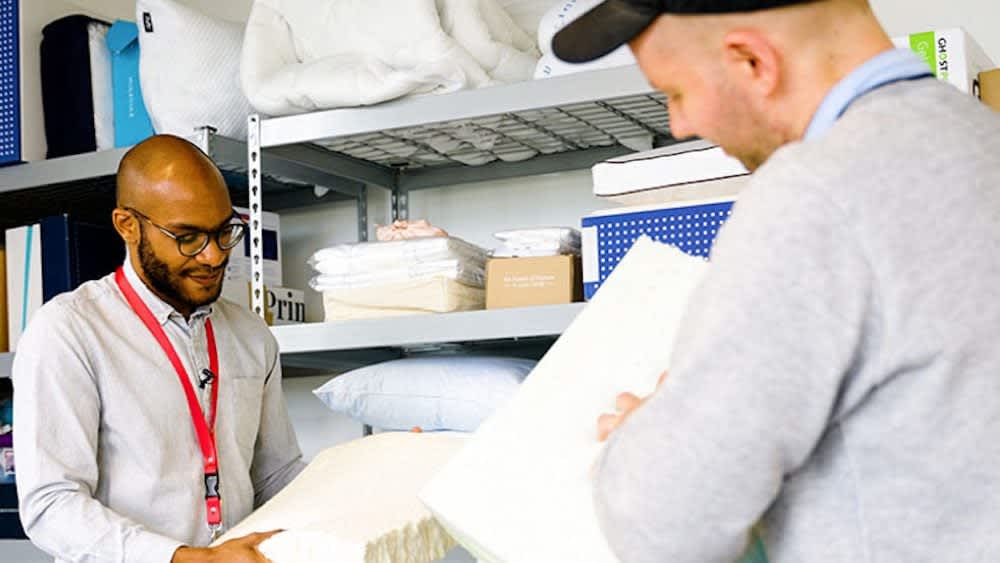
Dive Deeper – Mattress Guides by Type
Haven’t found your perfect mattress yet? Browse our library of mattress recommendations, categorized by type.
Best Mattresses by Type
- Best Mattress in a Box
- Best RV Mattress
- Best Mattress in Canada
- Best Smart Mattress
- Best Online Mattress
- Best Flippable Mattress
- Best Airbed Mattress
- Best Mattress for Bunk Beds
- Best Mattress on Amazon
- Best Temporary Air Mattress
- Best Walmart Mattress
- Best Pillow Top Mattress
- Best Crib Mattress
- Best Gel Mattress
Frequently Asked Questions
Can a mattress be fully organic?
It’s very difficult, though technically not impossible, for a mattress to be fully organic. Most organic mattresses contain some materials that are inherently non-organic, such as metal zippers.
Additionally, in the case of Talalay latex, a small percentage of non-organic fillers must be used to bind the foam together. If finding a fully organic mattress is important to you, look for models that button-tuft the layers together instead of using glue or adhesives.
You may find a hybrid mattress advertised as organic. The metal coils are of course not organic, since they’re not plant- or animal-based, but if they’re made from upcycled steel, then they’re considered to have a relatively low environmental impact and shouldn’t pose any health risks.
How much does an organic mattress cost?
Given the extra cost of ensuring environmentally friendly production methods and organic certifications, the most affordable organic mattresses usually start at $1,000 for a queen size, with many models costing upwards of $2,000. I always recommend shopping with time and being prepared to jump on mattress sales, especially around major shopping holidays like Memorial Day, President’s Day, and Black Friday.
Are organic mattresses worth it?
Each person has their own set of values when mattress shopping, but you may find an organic mattress is worth it if you’re concerned about the unsafe chemicals and negative environmental impact of a synthetic mattress. Organic mattresses also tend to be durable, highly breathable, and naturally responsive, meaning it’s easy to switch sleeping positions.
“While organic mattresses may have a higher upfront cost, their sustainability, durability and health benefits make them a better value over time, providing both long-lasting comfort and peace of mind,” says sleep medicine physician Pranshu Adavadkar, MD.
What is greenwashing and how do you spot it?
Greenwashing refers to when a company uses deceptive language or other tactics to deceive shoppers into thinking their product is environmentally friendly. Companies know that many shoppers are willing to pay more for organic products, so they try to capitalize on this.
It can be hard to spot greenwashing, especially if the company is outright lying. However, there are often a few telltale signs. Greenwashing might take the form of eco-friendly imagery, such as a website with lots of pictures of plants or landscapes, to make you think the product is natural. Or, a company might use words like “green,” “eco-friendly,” and “sustainable,” without explaining further. These words are vague, so it’s hard to prove them wrong.
Companies that actually care about sustainability tend to back up their marketing with a totally transparent explanation of where each material is sourced, along with certifications from third-party organizations.
What is the difference between an organic and a natural mattress?
All organic mattresses involve natural materials, but not all natural materials are organic. To obtain organic certification, a mattress must be made with natural materials that are grown and processed without the use of chemical fertilizers, pesticides, growth stimulants, or antibiotics. The final product also shouldn’t contain chemical glues or adhesives.
A mattress that’s natural but not organic may still have many of the same benefits as an organic mattress, such as breathability and durability.

Still have questions? Ask our community!
Join our Sleep Care Community — a trusted hub of product specialists, sleep health professionals, and people just like you. Whether you’re searching for the perfect mattress or need expert sleep advice, we’ve got you covered. Get personalized guidance from the experts who know sleep best.

